News
Year End Review 2019 – Department of School Education
In pursuance Prime Minister’s vision for ‘Transforming India’, Ministry of Human Resource Development took a leap forward in transforming education sector with the motto of “सबकोशिक्षा, अच्छीशिक्षा ”(Education for All, Quality Education).
Published
5 years agoon
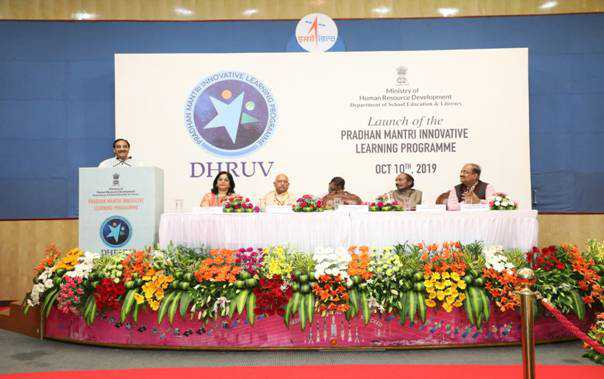
In pursuance Prime Minister's vision for ‘Transforming India’, Ministry of Human Resource Development took a leap forward in transforming education sector with the motto of “सबकोशिक्षा, अच्छीशिक्षा ”(Education for All, Quality Education).
In the year of 2019 Dr K. Kasturirangan Committee submitted the Draft National Education Policy to Union HRD Minister Shri Ramesh Pokhriyal ‘Nishank’. The Government of India had initiated the process of formulating a New Education Policy to meet the changing dynamics of the requirements of the population with regard to quality education, innovation and research, aiming to make India a knowledge superpower by equipping its students with the necessary skills and knowledge and to eliminate the shortage of manpower in science, technology, academics and industry. MHRD has launched Pradhan Mantri Innovative Learning Program (DHRUV) to identify and encourage talented children to enrich their skills and knowledge and also launched NISHTHA – National Initiative for School Heads’ and Teachers’ Holistic Advancement to improve learning outcomes at the elementary level through an Integrated Teacher Training Programme. Beside this, MHRD launched several new schemes in Higher Education Department to boost research & Innovation culture in the country. Department of Higher Education of HRD Ministry has finalized and released a five-year vision plan named Education Quality Upgradation and Inclusion Programme (EQUIP). SWAYAM 2.0, Deeksharambh andPARAMARSHare other major schemes of Department of Higher Education launched in 2019.
In the year of 2019, Ministry of HRD has actively participated in various nationwide campaigns like Ek Bharat Shreshtha Bharat (EBSB), Fit India Campaign, 70th anniversary of Constitution Day, 150th Birth Anniversary of Mahatma Gandhi among others. In order to preserve environment some campaigns have been initiated by MHRD. Save water and One Student One Tree are major successful campaigns of MHRD.
Major Achievements of Department of School Education & Literacy :
NISHTHA – National Initiative for School Heads’ and Teachers’ Holistic Advancement :
A National Mission to improve learning outcomes at the elementary level through an Integrated Teacher Training Programme called NISHTHA – National Initiative for School Heads’ and Teachers’ Holistic Advancement has been launched on 21st August, 2019. This integrated programme aims to build the capacities of around 42 lakh teachers and Heads of Schools, faculty members of SCERTs and DIETs and Block Resource Coordinators and Cluster Resource Coordinators.
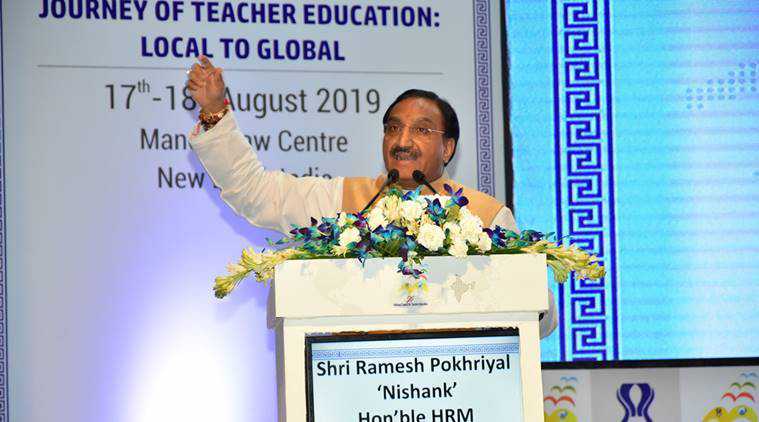
This training programme has been included as one of the two transformative ideas from Department for the 100 days programme of the Government. The initiative is first of its kind wherein standardized training modules are developed at national level for all States and UTs. However, States and UTs can contextualize the training modules and use their own material and resource persons also, keeping in view the core topics and expected outcomes of NISHTHA.
The Vice President of India, Shri M. Venkaiah Naidu gave the DHRUV batches to all the 60 students selected under DHRUV programmehave been broadly chosen from classes 9 to 12, from all schools including government and private.
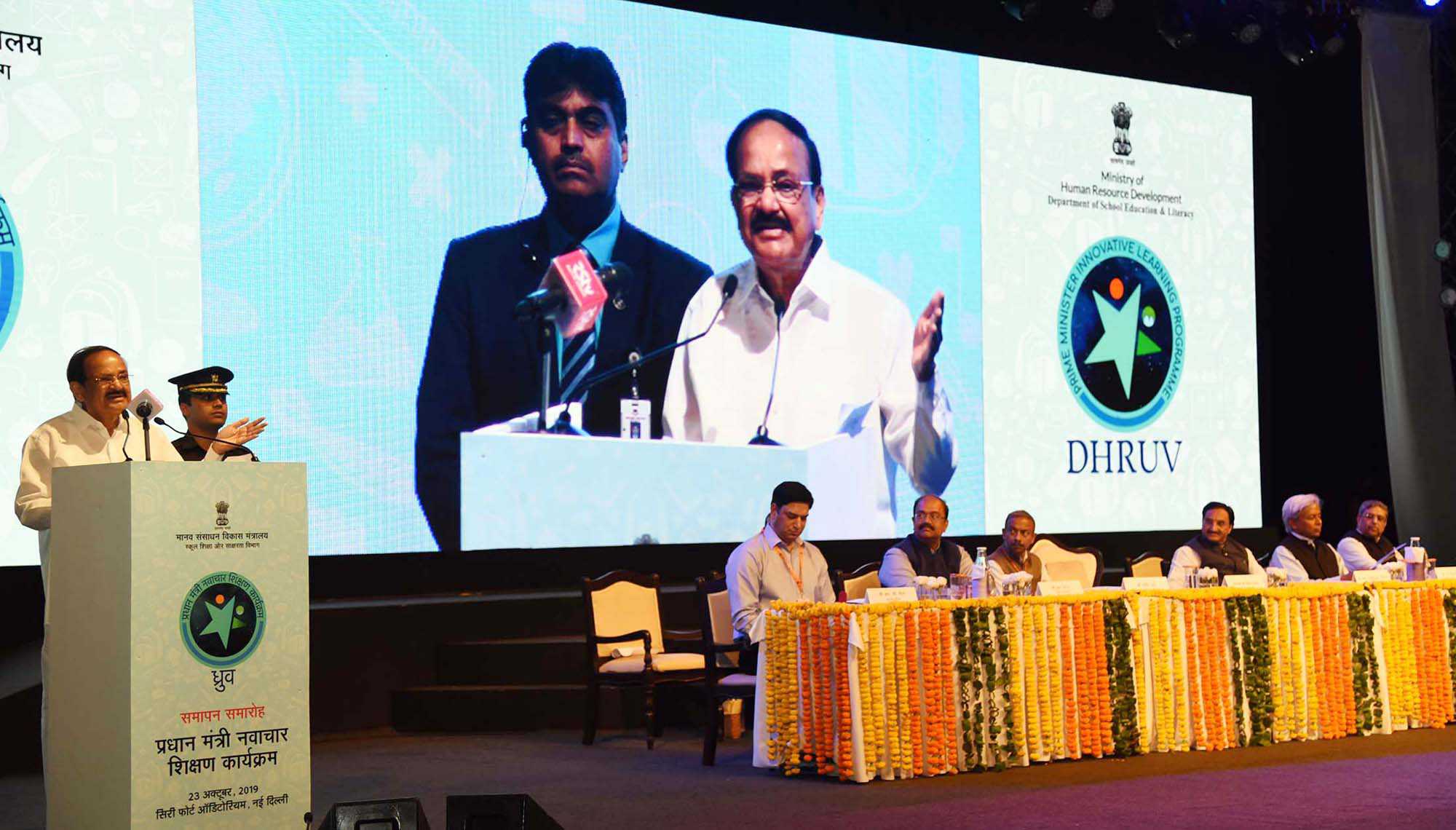
The students will both shine through their achievements and light a path for others to follow.
Union HRD Minister launches Integrated Online junction for School Education ‘Shagun’ :
Union Human Resource Development Minister Shri Ramesh Pokhriyal ‘Nishank’ launched one of world’s largest Integrated Online Junction for – School Education ‘Shagun’ in New Delhi on 28th August 2019. School Education Shagun (URL: htpp://shagun.govt.in/) is an over-arching initiative to improve school education system by creating a junction for all online portals and websites relating to various activities of the Department of School Education and Literacy in the Government of India and all States and Union Territories.
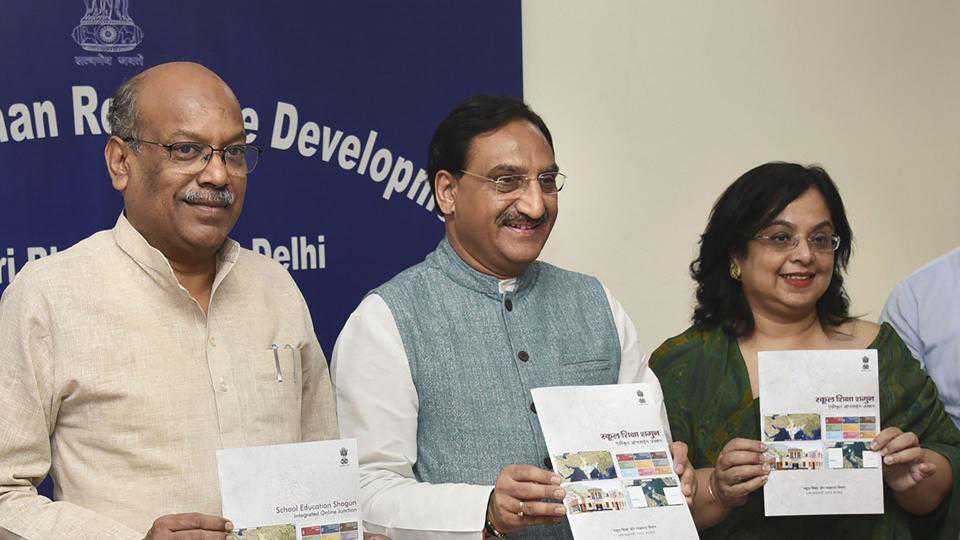
1200 KendriyaVidyalayas, 600 NavodayaVidyalayas, 18000 other CBSE affiliated schools, 30 SCERTs, 19000 organisations affiliated with NTCE among others are integrated with Shagun. Report cards of 15 lakh schools all over the country will be available on the newly created junction. The portal seeks to connect approximately 92 lakh teachers and 26 crore students.The website provides a very robust feedback mechanism. Common people can directly give their feedback about schools which will further increase the public participation and will ensure accountability and transparency.
President presents National Awards to 46 teachers from across the country for their exceptional contribution :
The purpose of National Awards to Teachers is to celebrate the unique contribution of some of the finest teachers in the country and to honor those teachers who through their commitment and industry have not only improved the quality of school education but also enriched the lives of their students.
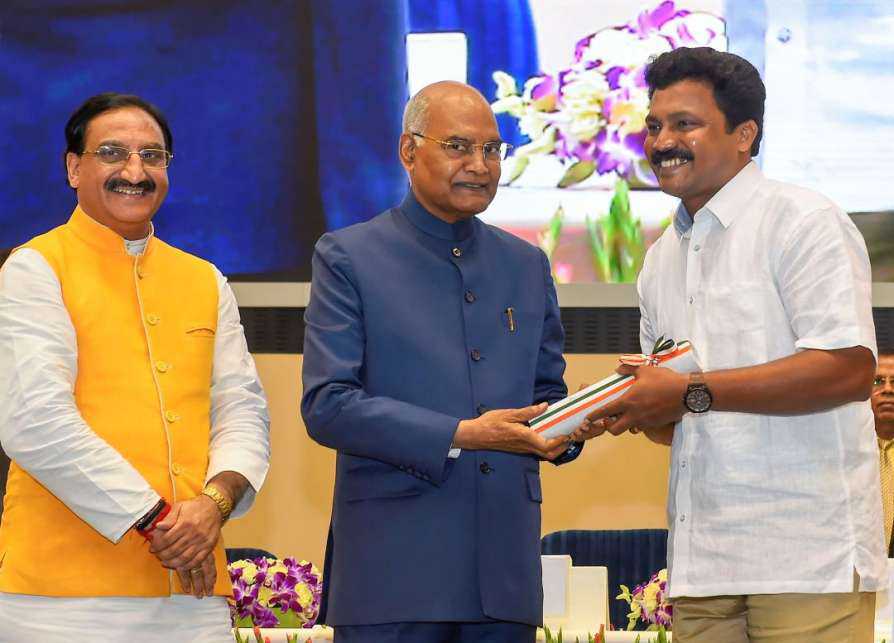
This year the online self nomination process followed by 3 tier selection process at District, State and National level has been completed. The Independent National Jury recommended name of 46 teachers. The award carries a Silver Medal, Certificate and Rs. 50,000/- as award money.
PM interacts with students, teachers and parents at “Pariksha Pe Charcha 2.0” :
The Prime Minister, Shri Narendra Modi, interacted with students, teachers and parents, as part of Pariksha Pe Charcha 2.0 at Talkatora Stadium, New Delhi on 29th January 2019. The interaction, which lasted for over ninety minutes, saw students, teachers and parents relax, laugh, and repeatedly applaud the Prime Minister’s observations, which included a touch of humour and wit.Students from across the country, and also Indian students residing abroad, participated in the event.
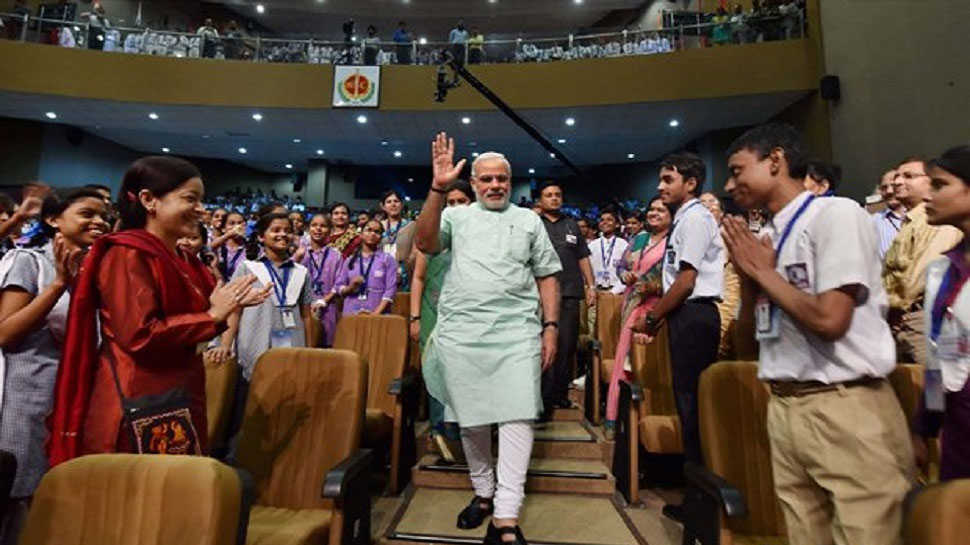
National Workshop of HRD Ministry on Social Media Outreach & Communication :
Union Human Resource Development Minister Shri Ramesh Pokhriyal ‘Nishank’ inaugurated the 'Social Media Outreach & Communication: National Workshop on Management and Best Practices'organised by Ministry of HRD for various educational institutions and organisations in New Delhi on 27th December.Nearly 200 Social Media Champions from various Centrally funded educational institutions participated in the workshop. The purpose of the workshop is to bring the social media communication and outreach of various institutions under one umbrella and to open a channel for day to day communication and dialogue with these institutions.
Unified District Information System for Education Plus (UDISE+) :
To ensure quality, credibility and timely availability of information from all the schools in the country, the revamped UDISE + has been launched by the Department. The GIS based mapping portal gives information about location of more than 15 lakh schools in the country along with some salient highlights. The Data Analytics portal gives percent information about the aggregate position of the school.
Digital Infrastructure for Knowledge Sharing (DIKSHA) 2.0 :
Diksha Portal was launched in 2017 for providing digital platform to teachers giving them an opportunity to learn and train themselves and connect with teacher community. This initiative has been taken forward to enhance coverage and improve the quality of e-content for teachers…All States and UTs and also KVs and NVs have been asked to involve proactively in curating contents for DIKSHA. NCERT, CBSE are also actively involved in taking the DIKSHA initiative forward. Till date, more than 67000 of content pieces have been hosted on DIKSHA and more than 10.5 crore scans have been affected.
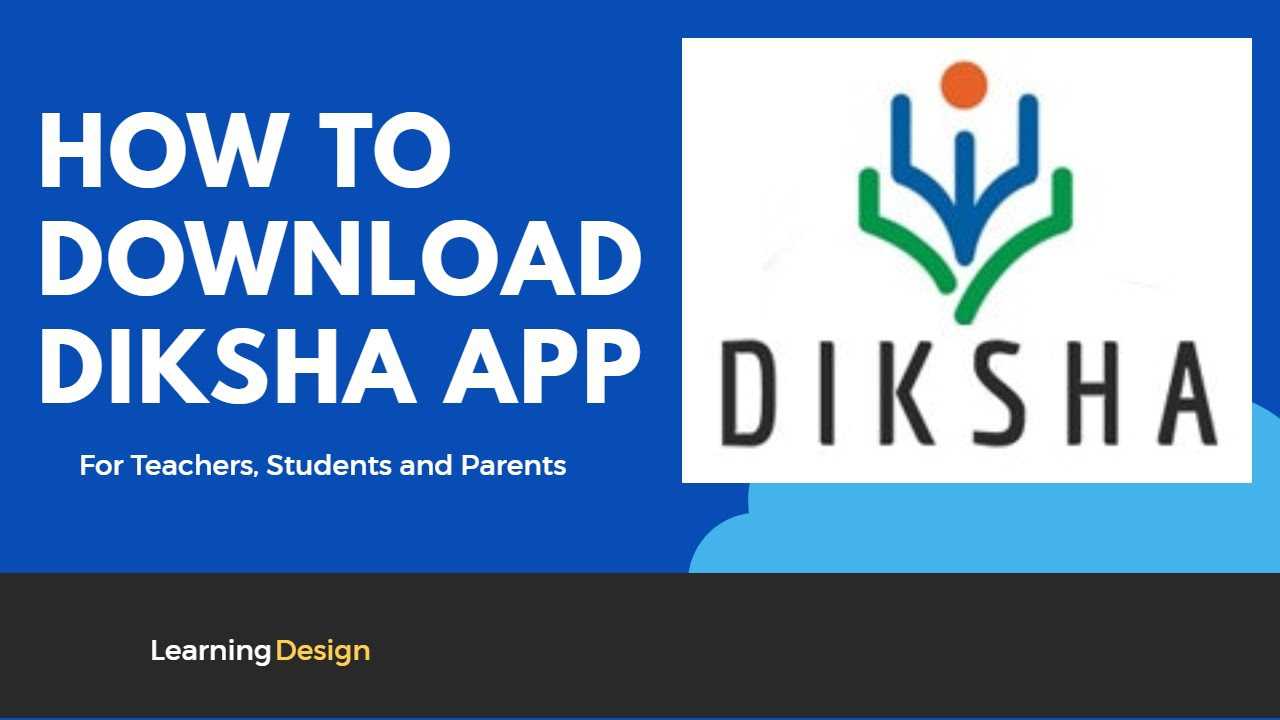
Performance Grading Index (PGI) :
To objectively evaluate the performance of the school education system in the States/UTs, MHRD has designed a 70 indicators based matrix called Performance Grading Index (PGI) to grade the States and UTs.
Operation Digital Board (ODB) :
The aim is to provide by March 2023, two smart classrooms for every Secondary/Senior Secondary schools in1,01,967 Government and 42,917 Aided schools in all States/UTs and 1704 KVs and NVs making a total of 1,46,588 schools. One-time amount of Rs.2.40 lakhs will be required to procure hardware, including accessories and a recurring cost of Rs.3.00 lakhs (for 5 years) for electricity charges, internet connection etc. The total budgetary requirement will be Rs. 8782.55 crore (Rs. 5671.50 crore required by the DoSEL, MHRD and rest Rs. 3111.05 crore by States) spread over a period from April 2020-21 to March 2026-27. Broad features of this project have been finalized and draft EFC note will soon be uploaded as per prescribed procedure (after ‘in principal’ approval of D/o Expenditure).
Scheme for Financial Assistance for Appointment of Language Teachers (ALT) :
The Centrally Sponsored restructured scheme of ‘Appointment of Language Teachers (ALT) Scheme’ has been launched for the remaining period of current FY 2019-20 i.e. from October, 2019 to March, 2020 for appointment and training of Hindi teachers in North Eastern States and the Urdu Teachers in States/UTs. A proposal is being prepared to extend this scheme.
Mid-Day Meal (MDM) :
The National Programme of Mid-Day Meal in Schools, popularly known as the Mid-Day Meal Scheme, is an on-going Centrally-Sponsored Scheme which covers all school children studying in Classes I-VIII of Government, Government-Aided, Special Training Centres including Madarsas and Maqtabs supported under Samagra Shiksha. During 2018-19, 11.98 crore children studying in 11.34 lakh institutions have been enrolled under the Scheme. A total of 24.95 lakh cook-cum-helpers have been engaged by the States/UTs under Mid-Day Meal Scheme and more than 90% are women. Out of 24.95 lakh cooks, 21% SCs, 15% STs, 42% OBCs and 7% are from Minorities.
** Releases as on date i.e. 23.12.2019
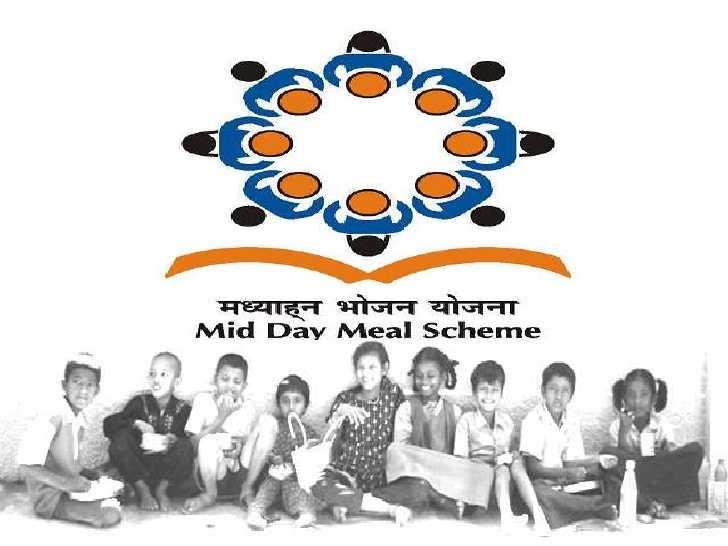
School Nutrition Gardens (SNG) :
A guideline on School Nutrition Gardens has been issued to all states and UTs. It is a place where herbs, fruits and vegetables are grown in the school premises for use in preparation of Mid-Day Meal.
Samagra Shiksha :
First time introduction of Library Grant and promotion of reading :
- The Central Government has launched the Integrated scheme for school education named as SamagraShikshaw.e.f 2018-19. Under the Samagra Shiksha, for the first time, Library grant at school level has been introduced.
- States/UTs have also been advised to set up Readers’ Club in schools in a phased manner with the help of National Centre for Children’s Literature (NCCL), is a wing of National Book Trust (NBT) to promote the habit of reading.
- In the year 2019-20, an outlay of Rs. 71164.78 lakh has been approved under library grant for 1009357 schools of different categories.
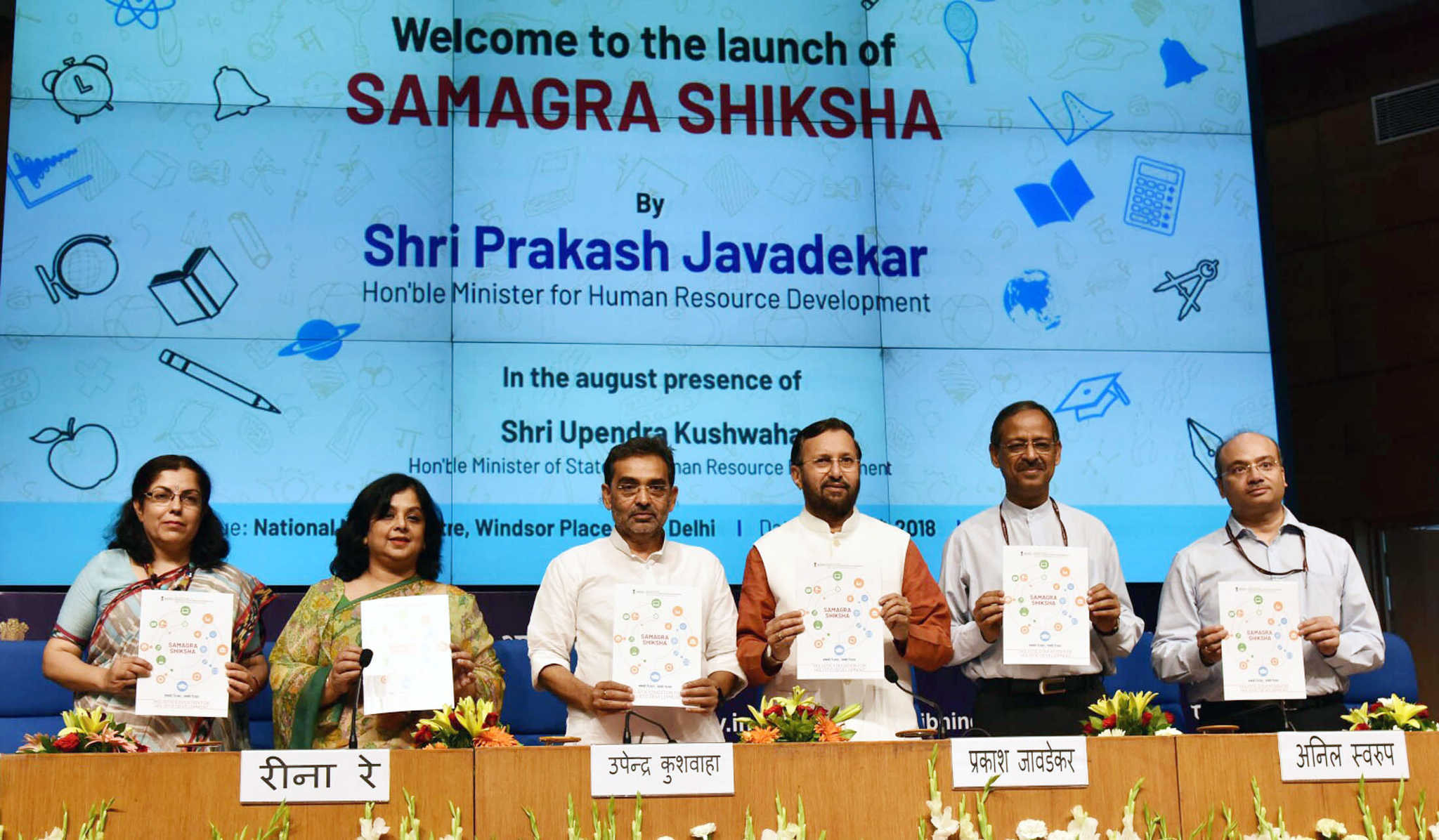
Sports and Physical Education :
- In the year 2019-20, an outlay of Rs. 800.40 crore has been approved under sports grant for 1002558 government schools of different categories.
- The fresh guidelines for sports and physical education are being prepared.
- NCERT organized Yoga Olympiad across the country at various levels, schools from states and UTs, Kendriya Vidyalaya Sangathan (KVS), Navodaya Vidyalaya Samiti (NVS) and Central Board of Secondary Education (CBSE) schools participated in the Yoga Olympiad, culminating in the National Yoga Olympiad on 18th to 20th June, 2019 at NCERT, New Delhi.
- Central Board of Secondary Education (CBSE) has made Health and Physical Education compulsory in all classes from I-XII. It has been advised to schools that Health and Physical Education includes three areas i.e. Health Education, Physical Education and Yoga and all three areas are essential to achieve holistic health (physical, mental, intellectual, emotional, social and spiritual).
Kasturba Gandhi BalikaVidyalaya :
- There are Four Types of KGBVs under Samagra Shiksha which are as under:
- Type-I: Existing KGBVs for classes VI to VIII.
- Type-II: KGBVs for classes VI to X.
- Type-III: KGBVs for classes VI to XII.
- Type-IV: Existing Girls’Hostel for IX to XII.
- Under Samagra Shiksha, total 5930 KGBVs have been sanctioned in the country out of which 4881 KGBVs are operational enrolling 6.18 lakh girls as on 30.09.2019.
- In the year 2019-20, Rs. 424750.05 lakh has been sanctioned for all KGBVs in the country.
Safety and Security of School Children :
- The Department of School Education and Literacy has issued a letter on 18.10.2019 to all States and UTs for display of ‘School Safety Pledge’ on a board or painted on wall at prominent places in all Schools. Under Samagra Shiksha, a provision of Rs. 500/- per school has been made in this regard. This Department is framing the guidelines for safety and security of school children. In this regard, consultations have been held with various stakeholders including students, teachers, Counsellors, Principals and School Managements.
Self Defence Training for Girls :
- Self defence training is being imparted to girls of class VI to XII belonging to Government Schools under Samagra Shiksha. Fund for this purpose is provided for three months @ Rs. 3000/- per school per month.
- Self defence training is also being given in Kasturba Gandhi BalikaVidyalayas.
- Under Samagra Shiksha, an amount of Rs. 15346.257 lakh has been estimated for 180160 Elementary Schools and Rs. 6656.358 lakh has been estimated for 81800 Secondary Schools for self defence training for the year 2019-20.
Equity :
- Bridging gender and social category gaps at all levels of school education is one of the major objectives of Samagra Shiksha. The Scheme attempts to reach out to girls, and children belonging to SC, ST, Minority communities and transgender.
- State specific interventions: Special state specific projects for varied interventions under equity are emphasized for enhancing access, retention and quality by promoting enrolment drives, retention and motivation camps, gender sensitization modules etc.
- State specific projects for varied interventions are sanctioned by the Project Approval Board as per the Annual Work Plans proposed by the State/UT concerned. A total of Rs. 21486.35 lakh at elementary level and Rs. 16083.22869 lakh at secondary level have been approved for various State specific projects for the year 2019-20.
National Means-cum-Merit Scholarship Scheme (NMMSS) :
- Scholarship to the 34493 students involving an amount of Rs. 40.71 crore has been sanctioned.
- Approx 1,33,460 successful application have been received on NSP.
National Scheme of Incentive to Girls for Secondary Education (NSIGSE) :
- Incentive amount of Rs. 8.56 crore to the 28547 beneficiaries girls have been sanctioned.
PARTICIPATION IN NATIONWIDE INITIATIVES :
1. Ek Bharat Shreshtha Bharat (EBSB) :
- HRD Ministry is the nodal ministry for this flagship campaign of Government of India.An illustrative list of suggested activities has been drawn up by the Department of School Education & Literacy. The Department has shared detailed guidelines including calendar of activities with all the States and UTs and concerned organizations for carrying out all the activities in all the schools.
- These activities include Ek Bharat Shreshtha Bharat Utsav, Talking Hour in morning assembly for news and information on partnering State, Student’s State Project Notebook, learning of alphabets and of folk songs, translation of proverbs and 100 sentences of partnering State, inclusion of few pages in course book in the language of partnering State, Know your Partnering State, Ek Bharat Shreshtha Bharat School Report, Themed Display Board and Wall Magazine, State Day celebration of partnering States, Cultural Competition on partnering State, Essay competition, Drama (on culture, history & tradition), Optional Classes on language of partnering State, Literary Fest, Pledge on Important National Campaigns in the language of partnering State and Ek Bharat Shreshtha Bharat annual report.
- The schools are to organize these activities as per the calendar shared by the Department or in coordination with partnering States/UTs, keeping in view the academic calendar. The schools are required to maintain a report on activities conducted under “Ek Bharat Shreshtha Bharat” in the form of quarterly and annual school report. The State/UTs have been requested to upload/send action taken report, videos and photographs of the activities at [email protected].
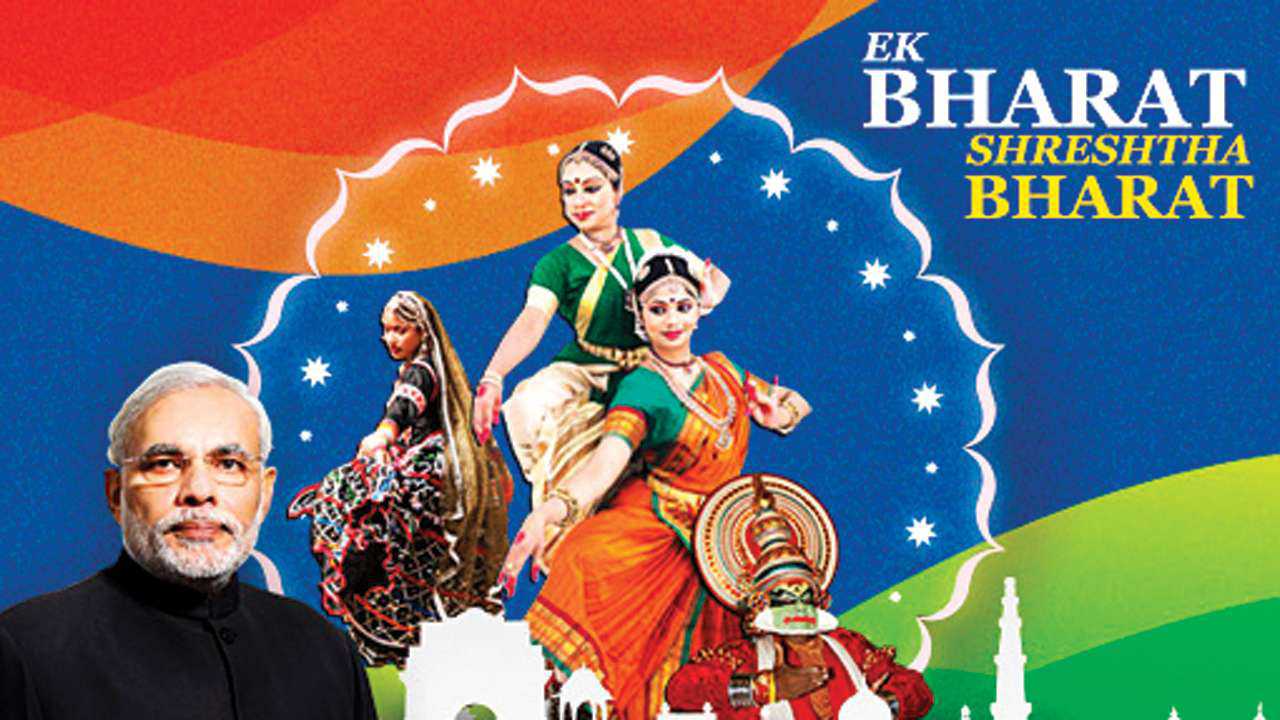
2. Fit India Campaign :
- The Fit India Movement was launched by the Prime Minister on 29th August, 2019 at Indira Gandhi Indoor Stadium, New Delhi.
- Department of School Education and Literacy in co-ordination with Department of Sports, organised the Fitness Pledge on 29th August, 2019 in States and UTs, KendriyaVidyalayaSangathan (KVS), NavodayaVidyalayas Samiti (NVS), Central Board of Secondary Education. Nearly, thirteen lakh schools and eleven crore students all over the country took the fitness pledge.
- Further, guidelines on Fit India Plogging Run prepared by Department of Sports were issued by Department of School Education and Literacy to States, UTs, KVS, NVS and CBSE to organize Fit India Plogging Run on 2nd October, 2019. Awareness on ‘No to Single Use Plastic’ and Collection of plastic garbage from homes, streets and open spaces was the main focus of the event.
- Department of Sports has prepared a ranking system of Fit India Schools to make Fit India a people’s movement. This department has written to all Principal Secretaries/Secretaries, School Education Department of States/UTs regarding “Fit India Movement-Fit India School” and to attain Fit India 3 or 5 Star.
- Following the recommendations of the reviewing Committee of Fit India Movement , the school education department has advised the States and UTs to organise daily fitness classes in all schools and all sports facilities available in States and UTs should be made available to the school students.
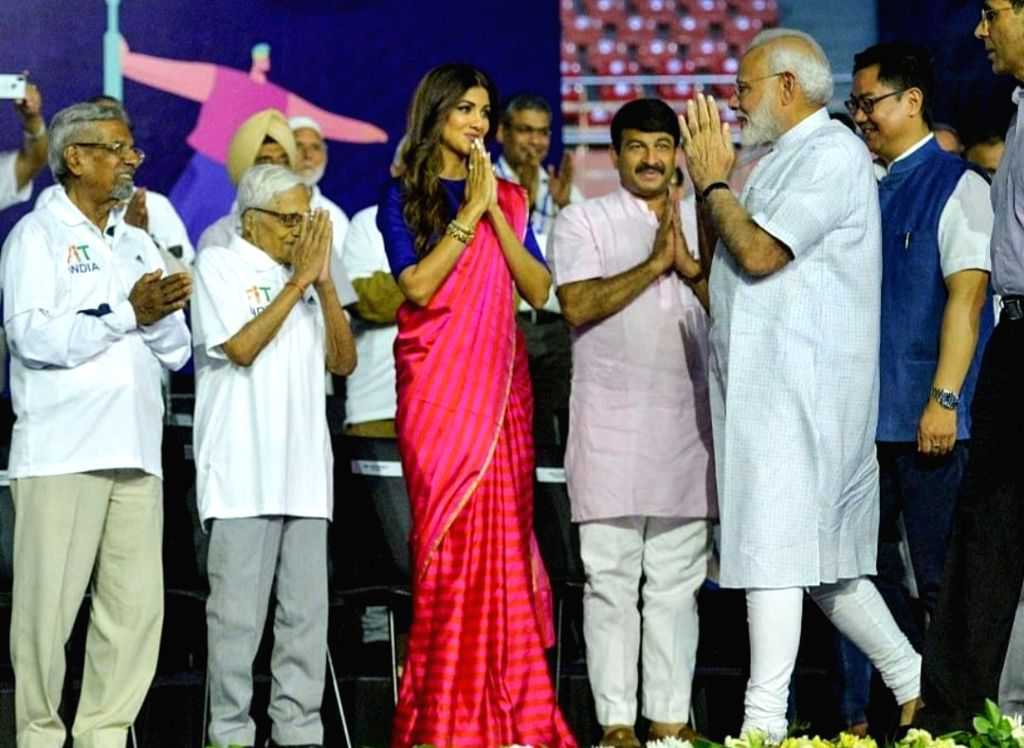
3. Constitution Day :
- Celebration of Constitution Day on 26th November, 2019 and yearlong activities are to be organised in all schools up to the 26th November, 2020. Accordingly, a calendar of activities was prepared and States and UTs were advised to carry out the following activities:
- Pledge taking ceremony to mark the occasion by reading of the Preamble to the constitution in a special assembly in the school
- Debates, essay competitions, cultural programs, quiz competitions, seminars and lectures etc. may be held at State, District and school levels.
- State level essay, debate and quiz competitions on fundamental duties and themes related to constitution may be organized across the State, the winners at State level may be suitably rewarded.
- Reading of Preamble and Fundamental Duties.
- Organizing Mock Parliament.
- Public messages on Fundamental Duties for dissemination among students and staff during the celebrations. Brochures, pamphlets and e-posters on Fundamental Duties may be prepared in Hindi, English and regional languages and distributed in schools among students.
- Effective utilization of Government/Organisation websites and MyGov platform to encourage citizen centric activities on the prescribed theme. Students may be encouraged to participate in online quiz/ Olympiad competitions being organized by MyGov.
- Invite eminent personalities from different walks of life to disseminate the message of Fundamental Duties.
- Talks by eminent lawyers and legal scholars on Fundamental Duties and related themes may be organised in schools.
About 9.63 lakh schools and 10.96 crore students participated in the reading of Preamble and other activities across the country on 26th November, 2019.
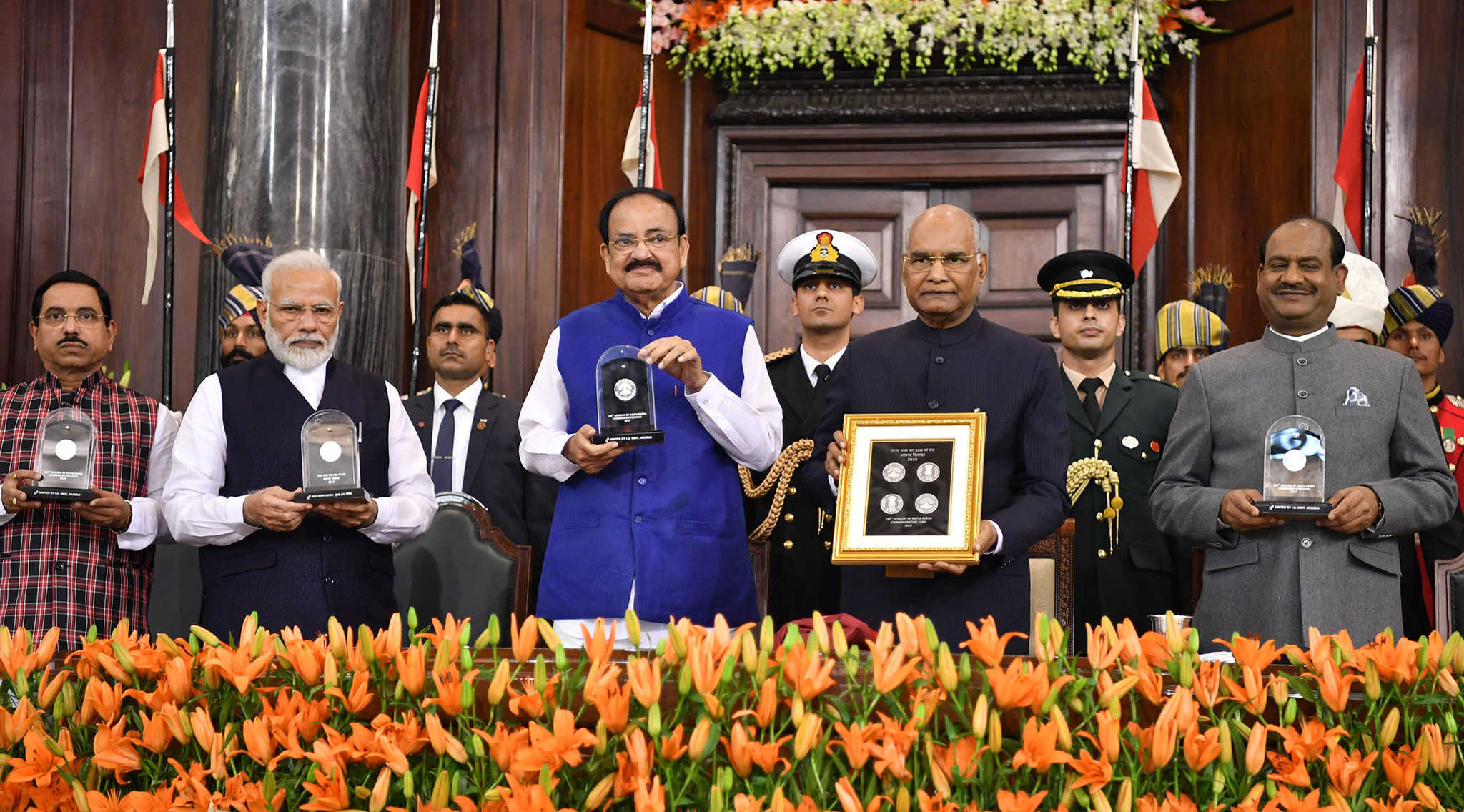
4. 150th Birth Anniversary of Mahatma Gandhi :
- 150th Birth Anniversary of Mahatma Gandhi is being commemorated for a period of two years from 2nd October, 2018 to 2nd October, 2020 throughout the nation as well as at international level. The Department of School Education & Literacy is conducting nationwide activities for the same. The following activities have been completed by Dept. of School Education & Literacy:
- CBSE organised Expression Series on Mahatma Gandhi from 19th August to 3rd September, 2019. Approximately 4.5 lakh students participated across the country. 4314 shortlisted entries were uploaded by schools on CBSE Expression Series App out of which 18 selected as best entries. The Expression Series was based on the life, vision and philosophy of the father of the nation. The series was meant to provide a creative outlet to children and provide them with a platform to express themselves on various themes. The winners of the series were felicitated by HRM on 1st October, 2019 in the programme organized to commemorate 150th Birth Anniversary of Mahatma Gandhi.
- A large National Level Function was organised on lst October, 2019 at Dr. Ambedkar International Centre (DAIC), New Delhi
- Swachh Bharat Diwas (Shramdan: Plastic Waste Collection) was organized on 2nd October 2019 and 6,70,33,153 students of 7,73,050 schools participated in Shramdaan for Plastic Waste Collection on 2nd October 2019.
- Intensive programmes and activities on Mahatma Gandhi were organized in schools during the week from 23rd September, 2019 to 2nd October, 2019.
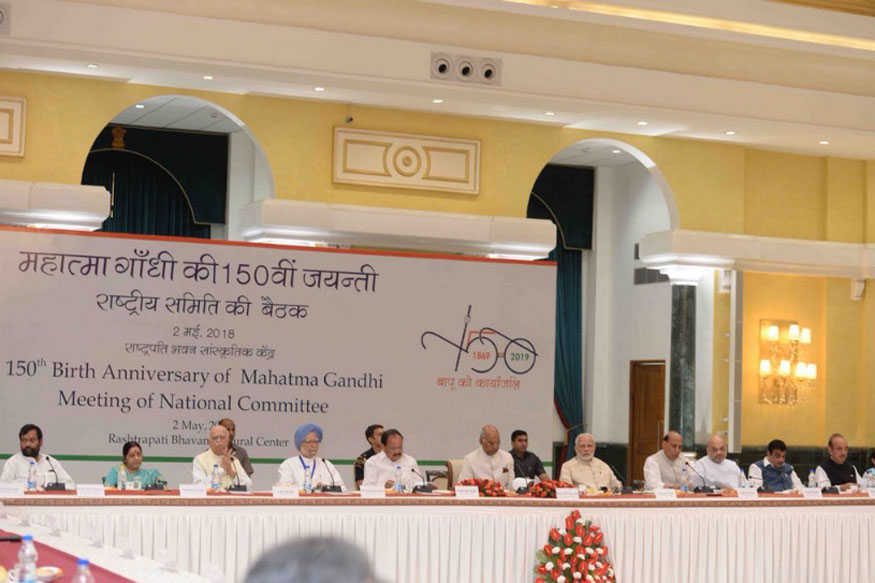
Kala Utsav :
- Kala Utsav is an initiative of the Department of School Education & Literacy to recognize the importance of aesthetics and artistic experiences for school students, which play a major role in creating awareness of India’s rich cultural heritage and its vibrant diversity. The National level Kala Utsav is scheduled to be held at Bhopal, Madhya Pradesh form 2nd -5th January, 2020. Competitions will be held in the four themes of Vocal Music, Instrumental Music, Dance and Painting at District and State levels and the winning teams thereafter will participate at the national level competition. The Students of Classes IX to XII of any Government, Government –aided and Private schools may participate in Kala Utsav. A total of 38 teams (36 State/UTs +KVS+NVS) are likely to participate at the National level.
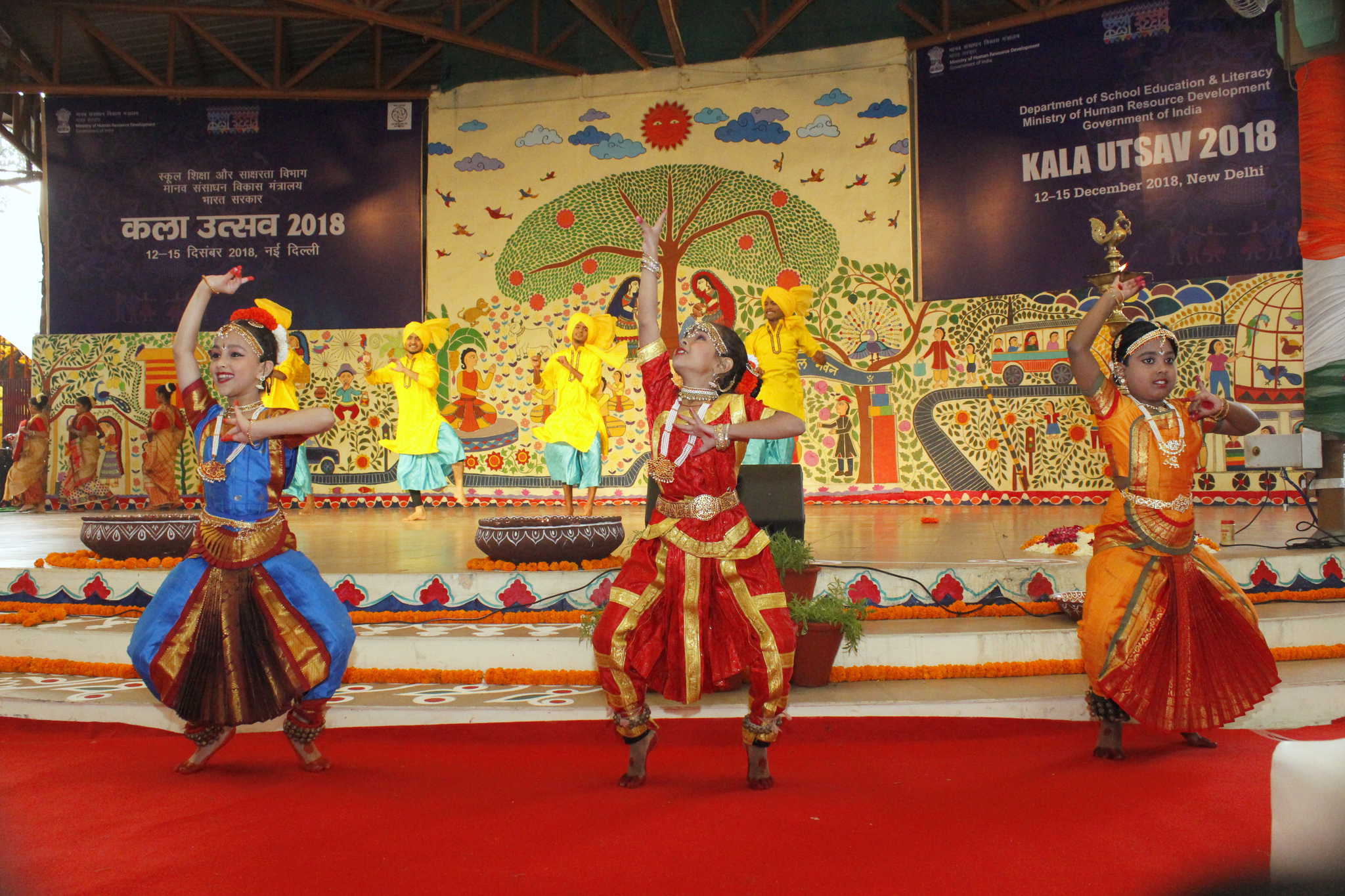
Scheme for Providing Quality Education in Madrasas (SPQEMU :
- Project Approval Meeting of the SPQEM was held on 16th September,2019 wherein Rs. 8788.00 lakh for General States and UTs with Legislature has been approved. Whereas an amount of Rs. 950.00 lakh and 2.00 lakh were approved for NER states and UTs without Legislature respectively.
- Till date, Rs. 5912.808 lakh has been released to States under SPQEM. File of Rs.806.10 lakh has been processed/under submission.
Infrastructure Development of Private Aided/Unaided Minority Institutes (IDMI) :
- Project Approval Meeting of the IDMI was held on 27th November, 2019 wherein Rs. 2000.00 lakh for General States and Rs. 250 lakh for NER States have been approved.
- An amount of Rs. 303.63 lakh under IDMI scheme has been processed to release.
Snapshot of Coverage of Children with Special Needs -CwSN (2019-20) :
- More than 20 lakh CWSN enrolled in schools or receiving home based education.
- Rs. 136375.31 lakh estimated for various interventions of Inclusive Education for CWSN for the year 2019-20.
- Braille textbooks are being provided to 40,311 children with visual impairment at elementary level (class I to VIII) with an estimated outlay of Rs. 123.25 lakh.
- Large print books are being provided to 91,254 children with low vision at elementary level (class I to VIII) with an estimated outlay ofRs.289.00 lakh.
- Outlay of Rs. 619.09 lakh has been estimated for in-service training of 26,817 special educators.
- 5.96 lakh girls with special needs receiving stipend through Direct Benefit Transfer (DBT).
- More than 2.32 lakh CWSN using aids and appliances through scheme/s like ADIP etc.
- Total outlay of Rs. 1911.05 lakh has been estimated for conducting 17,734 sports events and exposure visits thus promoting social inclusion.
- Approximately 64.24% of schools at elementary level and 58.28% at secondary level are equipped with ramps with handrails and approximately 19.59% of schools at elementary level and 24.40% at secondary level have disabled friendly toilets (DFT) to enhance retention of CWSN in regular schools.
- An outlay of Rs. 1995.93 lakh has been estimated for 58,392 assistive devices, equipmentsand teaching learning materials (TLM).
- Engagement of 28,285 resource persons and special educators have been estimated to cater to the diverse & unique needs of CWSN from elementary to higher secondary level.
Initiatives by autonomous organizations for CwSN :
- Books in Accessible Format on e-Pathshala Portal for CwSN has been developed by NCERT, the ePathshala mobile app supports Text to Speech to help children with visual impairment.
- Audio books have been developed by NCERT, in which textbooks are presented in audio form, to help the visually challenged learners
- NCERT has developed Tactile Map Books with 25 maps and diagrams, with Braille and English text to encourage collaborative learning.
- CBSE’s provision for CwSN: Exemptions/ Concessions Rules Applicable for Both Class X & XII Board Exam Facility of Scribe and compensatory time: Candidates with disabilities as defined in The Rights of Persons with Disabilities Act 2016 are permitted to use a Scribe or allowed Compensatory time etc.
CONSTRUCTION OF JNV BUILDINGS :
- As per 100 days action plan, newly constructed building of 10 JNVs i.e. Kanshiram Nagar(UP), Malkangiri-II (Odisha), Sitapur-II (UP), Dang (Gujarat), Navsari (Gujarat), Puri (Odisha), Palwal (Haryana), Bhandara (Maharashtra), Jhabua-II (MP), Ahemdabad (Gujarat) were inaugurated.
- As a part of 100 days agenda foundation laying done in respect of 10 JNVs and construction work begun viz. SefaiJala (Tripura), South Tripura (Tripura), South West Khasi Hills (Meghalaya), Jalpaiguri (W.B.) Kalaburgi-I (Karnataka) & Kolar (Karnataka) Jhabua (MP) &Mahisagar (Gujarat).
- · Construction of additional dormitory has been completed in JNV Srikakulam, JNV Vishakhapatnam, JNV Vijayanagaram, JNV Kodagu & JNV Mandya.
- · Infrastructure for implementation of Rooftop grid connected Solar power has been completed on 176 sites. Generation of power has also been started on 12 sites. On other JNVs, net metering is awaited.
RECRUITMENT :
- Process for engagement of 01 male and 01 female counsellor in all functional JNVs has been completed. Recruitment for filling up 2370 posts advertised on 9th July, 2019 is at advance stage of completion.
- Offers of appointment to 218 PGTs have been issued. Joining status is awaited.
It eliminates the prevailing manual system of service processes followed in the organization & to improve access to real-time data for decision support and to enhance efficiency and transparency of school operations, development of “ShaalaDarpan” project is has been developed with the help of C-DAC, Ministry of Electronics and Information Technology.
ACADEMIC EXCELLENCE of NVS Students :
ADMISSION IN IITS, NITS AND MEDICAL COLLEGES OF NVS STUDENTS : 2019
|
JEE |
NEET |
|||
|
Appeared in JEE Main |
11733 |
Appeared in NEET |
16156 |
|
|
Qualified in JEE Main |
4451 |
Qualified in NEET |
12654 |
|
|
Qualified in JEE Advanced -First list |
966 |
|||
TREE PLANTATION :
All field units of NVS have been instructed to implement “One Student One Tree Campaign”. It aims at involving school students in raising plant nurseries to bring them closer to natural environment, help them understand the natural processes of germination and feel the joy of watching saplings grow. Students are involved in activities right from sowing the seed to transplanting, watering, weeding etc. so that students can learn the process also. More than 2.40 lakhs saplings were planted by the of students of JNVs in 2019-20.
SHAALA DARPAN :
ShaalaDarpan portal of NVS has been launched on 06.11.2019 at National Museum Auditorium, New Delhi by Shri Sanjay Dhotre, Minister of State for HRD.
Digital initiatives :
Process of application for the Class VI examination has been made online leading to better access for the rural population to the application process. Faceless admission process has resulted in more transparency and least corruption.
- Process of transfer has been made online which has resulted in increased transparency and timely completion of the process.
- Recruitment process has been made online and faceless till appointment. The appointment letters are also downloaded by candidates using their login password.
Achievements-2019
- Inauguration of new constructed school buildings: 17 newly constructed school buildings of KendriyaVidyalayas were inaugurated .
- Foundation Stone laying of school buildings : Minister of HRD has laid the foundation stone of 7 school buildings of KendriyaVidyalayas.
- Opening of New KendriyaVidyalayas : During last 6 months 25 KendriyaVidyalayas have been opened.
- Filling up of vacancies:The details of posting of staff in the last 6 months in various KendriyaVidyalyaas / Regional Offices / KVS (Hqrs.) are as under :
|
S.No. |
Name of Post |
Pay level |
No. of offer of appointment issued |
|
|
PRT |
06 |
3000 |
|
|
TGT (English, Hindi, Maths, Science, Social Studies, Sanskrit) |
07 |
3473 |
|
|
Assistant Section Officer |
06 |
31 |
|
|
Senior Secretariat Assistant |
04 |
218 |
|
|
Junior Secretariat Assistant |
02 |
684 |
|
|
Steno. Grade II |
04 |
37 |
|
Total |
7443 |
||
Click here for more details on KVS achievements.
CENTRAL BOARD OF SECONDARY EDUCATION (CBSE)
Achievement-2019
CBSE has taken up several initiatives like formation of Hubs of Learning programme, training school teaches, process of recruitment of teachers, a new Vidya-Daanprogramme, preparation of students for PISA 2021, celebration of 150 years of Mahatma Gandhi, AryabhatGanit Challenge , handbooks on Artificial Intelligence for school children, and participation in national Campaigns like Fit India, Swachchtha, EBSB among others.
Click here for details of activities of CBSE.
NATIONAL COUNCIL FOR TEACHER EDUCATION :
Integrated Teacher Education Programme (ITEP) :
NCTE has invited applications form the institutions seeking recognition for 4-year Integrated Teacher Education Programme (ITEP). The institutions have submitted online applications which will be processed as per the provisions stipulated in the relevant Regulations. Applications were invited between 03.06.2019 and 31.07.2019.
Launching of online Performance Appraisal Report system (PAR) :
One of the conditions of recognition by NCTE is to direct the filing of a Performance Appraisal Report annually, which includes annual statement of accounts duly audited by a Chartered Accountant
The Online Performance Appraisal Report (PAR) system was formally launched on 23rd September 2019 and all recognized TEIs are required to fill up data on various regulatory parameters.
Launching of Online Teacher-Pupil Registration Management System (OTPRMS) :
Some prospective employers prior to employing a person as a teacher require verification of recognition status from NCTE regarding degree/diploma/certificate in teacher education. In this regard, the NCTE has launched Online Teacher-Pupil Registration Management System (OTPRMS) to facilitate candidates who have passed out of teacher education programmes from NCTE recognized institution (s). This programme was launched on 26.07.2019.
Silver Jubilee Celebrations :
The NCTE in its Silver Jubilee year organized an International Conference with the theme “Journey of Teacher Education: Local to Global on 17th and 18th August, 2019. The Conference highlighted the achievements of the Indian education system and facilitated dissemination of quality global practices in teacher education.
The NCTE intends to engage its resources towards launching “Project Lighthouse” by identifying 700 institutions, approximately one in each district of the country in the first phase. The partner Teacher Education Institutions (TEIs) will be selected by NCTE through a transparent procedure and they shall be academically and administratively supported and mentored for running an emblematic 2-year B.Ed. programme from the academic session 2020-21 onwards. This programme is expected to prepare 70,000 exemplar teachers in the year 2020-22. The selection of the 700 TEIs shall be done for 5 consecutive years after which 3,500 model TEIs will be capacitated to prepare a total of 3,50,000 quality teachers trained at international levels of competence. The TEIs so selected will be supported with several specific interventions like a centralized entrance examination for admission of students, a revised and up-to-date curriculum, capacity building of the teacher educators, etc. It is also envisioned to arrange for international placement of some selected student-teachers of these TEIs.
- Instituting “Best Teacher Educator Award” to be given to 20 exemplary teacher-educators every year.
The NCTE has initiated a programme for awarding 20 meritorious teacher educators every year. The first instalment of awards will be given in 2020.

You may like
-
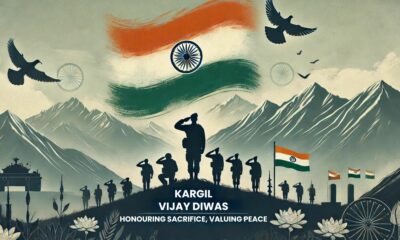

Remembering Kargil Vijay Diwas: A Lesson in History, Sacrifice, and Peace for Our Children
-
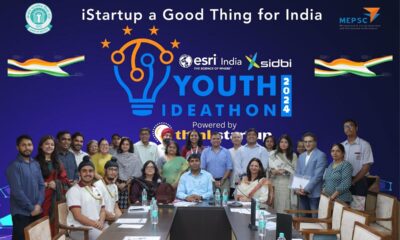

Youth Ideathon 2024: CBSE Launches India’s Biggest Entrepreneurship Competition for School Students
-
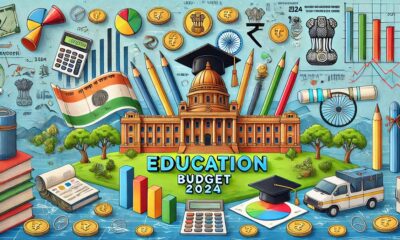

Internships in Top 500 Companies, Rs 5k Stipend for Youth: Key Highlights from the Education Budget 2024
-
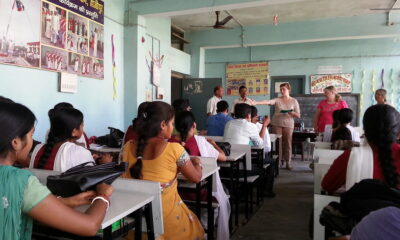

Higher Education Enrollment Jumps To Nearly 4.33 Crore In FY22, Up 26.5% From FY15
-


UNESCO Report Highlights Need for Boost in India’s Upper Secondary Education
-


Embracing Emojis in the Classroom: A Fun and Polite Approach to Modern Learning
-
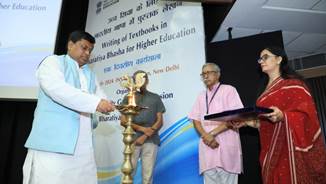

Workshop on Writing Textbooks in Bharatiya Bhasha for Higher Education Inaugurated by Dr. Sukanta Majumdar
-
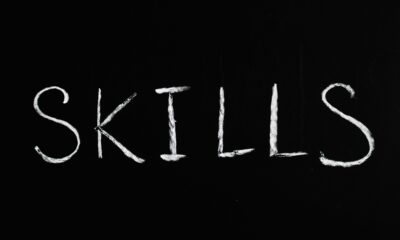

Nurturing Natural Skills: Empowering Youth for the Future
-


Global Education Crisis Demands Immediate Action, Says UN Secretary-General
-


Celebrating Nikola Tesla: A Beacon for Transforming Education
Education
Youth Ideathon 2024: CBSE Launches India’s Biggest Entrepreneurship Competition for School Students
Published
2 days agoon
July 25, 2024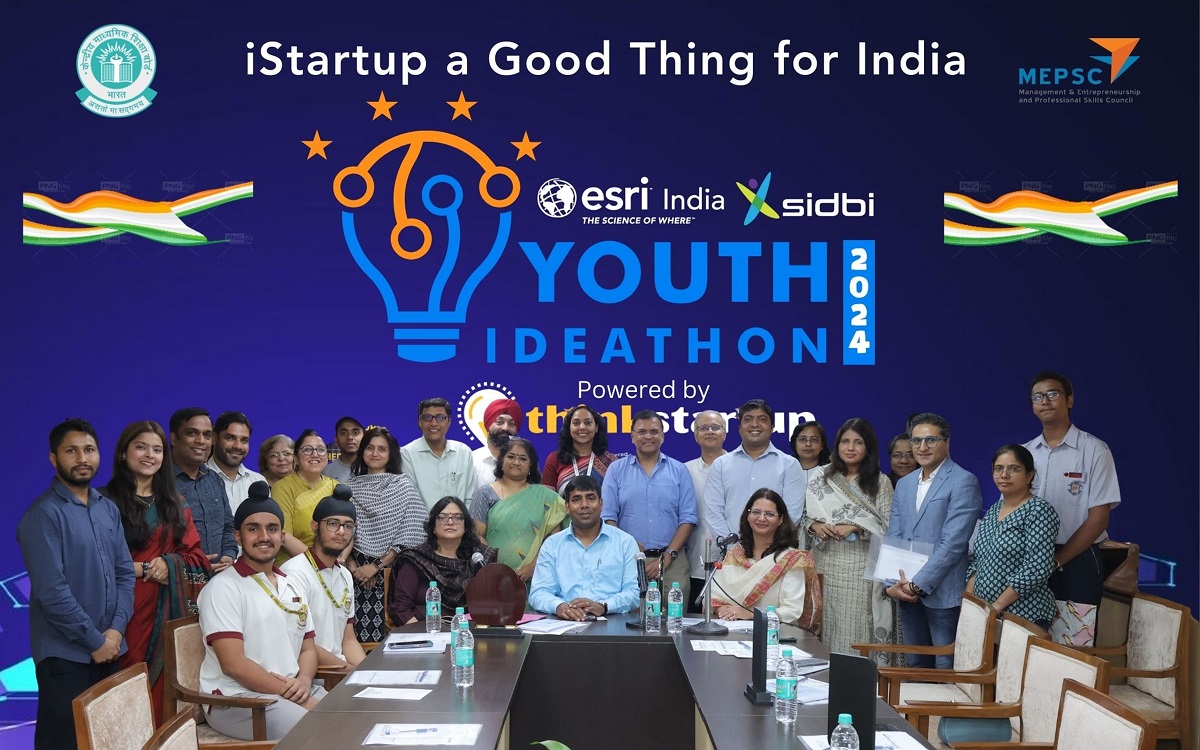
ThinkStartup, India’s leading entrepreneurship education platform, in association with the Management Entrepreneurship Professional Skills Council (MEPSC) under the Ministry of Skill Development and Entrepreneurship, and the Central Board for Secondary Education (CBSE), announced the launch of the 4th edition of Youth Ideathon (YI24). This prestigious Innovation and Entrepreneurship festival aims to harness the creativity and entrepreneurial spirit of young minds across India.
The theme for this year’s Youth Ideathon is “iStartup a Good Thing for India.” The competition will be held in five stages, initially online, and is open to all school students in India, divided into Junior (Class 4 to Class 8) and Senior (Class 9 to Class 12) categories. Students will compete in teams of 3 to 5 members from the same school. The grand finale is set for October 6, 2024. Last year, the Ideathon attracted over 1.5 lakh students from more than 8,000 schools, and this year aims to see participation from over 2 lakh students across 10,000 schools.
Dr Biswajit Saha, Director (Skill Education & Training), CBSE, remarked, “Entrepreneurship is an essential pillar of the New Education Policy 2020, and the Youth Ideathon platform allows students to think bravely and showcase their talents.”
Mamta Kumari, Deputy General Manager, SIDBI, added, “Initiatives like Youth Ideathon 2024 nurture the entrepreneurial spirit among young minds, creating over 200 internships for school students in fields such as technology and digital marketing.”
Shivani Singh-Kapoor, Co-founder of ThinkStartup, emphasised the importance of nurturing young talent, stating, “Youth Ideathon empowers the next generation by nurturing high-potential student ideas with incubation support.”
The competition is supported by industry leaders such as Esri India and MediaTek. Agendra Kumar, Managing Director of Esri India, noted, “Youth Ideathon channels the creativity of young minds towards addressing pressing social, environmental, and economic challenges.”
Anku Jain, Managing Director of MediaTek India, echoed this sentiment, saying, “By supporting platforms like Youth Ideathon, we aim to generate more startups, create jobs, and cultivate groundbreaking ideas.”
Sanjeeva Shivesh, Program Director of Youth Ideathon, highlighted the new frugal startup challenge, offering Rs. 1000 cash to the top 500 teams to build a prototype or small venture.
Youth Ideathon 2024 also receives support from SheAtWork and BRICS CCI WE. Ruby Sinha, Founder of SheAtWork, stated, “Youth Ideathon addresses both SDG 4 and SDG 5 goals of quality education and gender equality.”
Participants will receive certificates, with top teams competing for incubation grants up to Rs. 100,000. Special recognition will be given to teachers, mentors, and schools with high participation rates.
Education
Internships in Top 500 Companies, Rs 5k Stipend for Youth: Key Highlights from the Education Budget 2024
Published
3 days agoon
July 24, 2024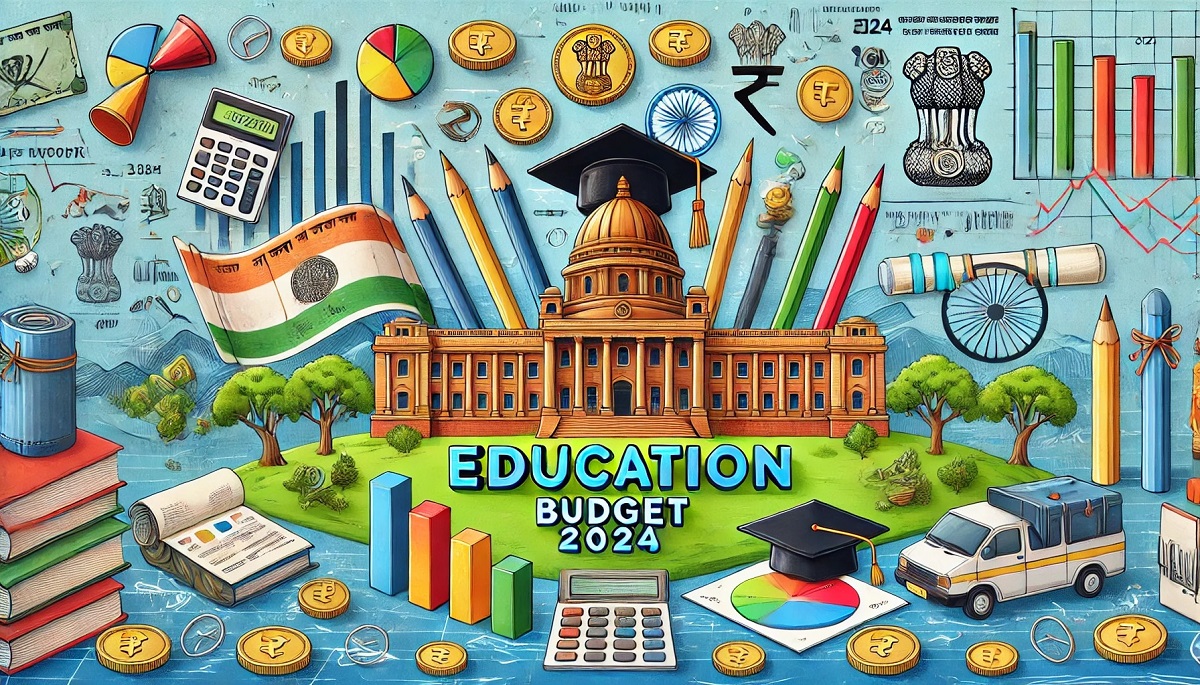
Finance Minister Nirmala Sitharaman presented the Budget 2024 yesterday, marking the first budget of the BJP-led NDA after Prime Minister Narendra Modi began his third term. The budget introduced significant allocations aimed at bolstering education, employment, and skilling, with a notable allocation of Rs 1.48 lakh crore for these sectors.
Education Budget 2024: Rs 1.48 Lakh Crore Allocated
A new scheme offering internship opportunities at 500 top companies for 1 crore students over the next five years was one of the major highlights. Each student will receive a monthly stipend of Rs 5,000 and a one-time assistance payment of Rs 6,000. This initiative is designed to bridge the gap between academia and industry, providing practical experience to young learners.
“The government’s initiative to provide financial support for higher education loans up to Rs 10 lakh is commendable. This move will enhance accessibility to quality education,” said Dilip Gangaramani, Founder Director & CEO of Target Publications Pvt. Ltd. “The allocation of Rs 2 lakh crore for employment and skilling initiatives is also a positive step towards addressing youth unemployment.”
Major Employment and Skilling Schemes
The Finance Minister announced a substantial PM Package consisting of five programmes aimed at boosting employment and skilling, with a total allocation of Rs 2 lakh crore. Among these, Rs 1.48 lakh crore has been specifically allocated for education, employment, and skilling. The initiatives will skill 20 lakh youth over a five-year period, significantly contributing to the nation’s workforce by equipping young individuals with necessary skills to thrive in various industries.
25,000 Students to Avail Loan Benefits Every Year
The budget also introduced model skill loans. “Skilling loans – model skill loans schemes for up to 7 lakh rupees will benefit 25,000 students every year,” stated Finance Minister Sitharaman. This initiative aims to support students financially in acquiring necessary skills, thus enhancing their employability and career prospects.
“This year’s budget strikes a fine balance between fiscal discipline and drivers of economic and social growth. Enhanced initiatives on women empowerment and education underscore the focus on welfare schemes,” noted Dr Rakesh K Singh, Professor and Associate Dean – Academics at IMT Ghaziabad. “Structural reforms propose new policies to foster innovation and skill development in emerging areas such as AI and renewable energy.”
Comparison with Previous Budget
In the Union Budget 2023, the central government’s allocation for the education sector was Rs 1,12,898.97 crore, the highest allocation granted to the Ministry of Education at the time. The Union Budget 2024 reflects a strong focus on education, employment, and skilling, with significant investments aimed at creating a more skilled and educated workforce. The announced programmes and allocations are expected to drive improvements in educational infrastructure, job creation, and skill development across the nation.
“The government will also offer internships in 500 of India’s top companies. The companies can employ these interns through their CSR funds. As a support to employers, reimbursement of up to Rs 3,000 per month for two years towards their EPFO contribution for each additional employee will be provided,” stated Balkishan Sharma, Chairman & Founder at FVEG. “These new schemes aim to create new jobs and provide employment to well-educated youth.”
A Step Towards a Skilled Workforce
“The proposed comprehensive internship programme for one crore youth is a commendable initiative,” added Gangaramani. “These measures, if implemented effectively, can significantly boost India’s human capital development and contribute to a more skilled and employable workforce.”
The Budget 2024, with its focus on education, employment, and skilling, aligns with the nation’s developmental goals and is a welcome step forward in building a robust and future-ready workforce.
Education
Higher Education Enrollment Jumps To Nearly 4.33 Crore In FY22, Up 26.5% From FY15
Published
5 days agoon
July 22, 2024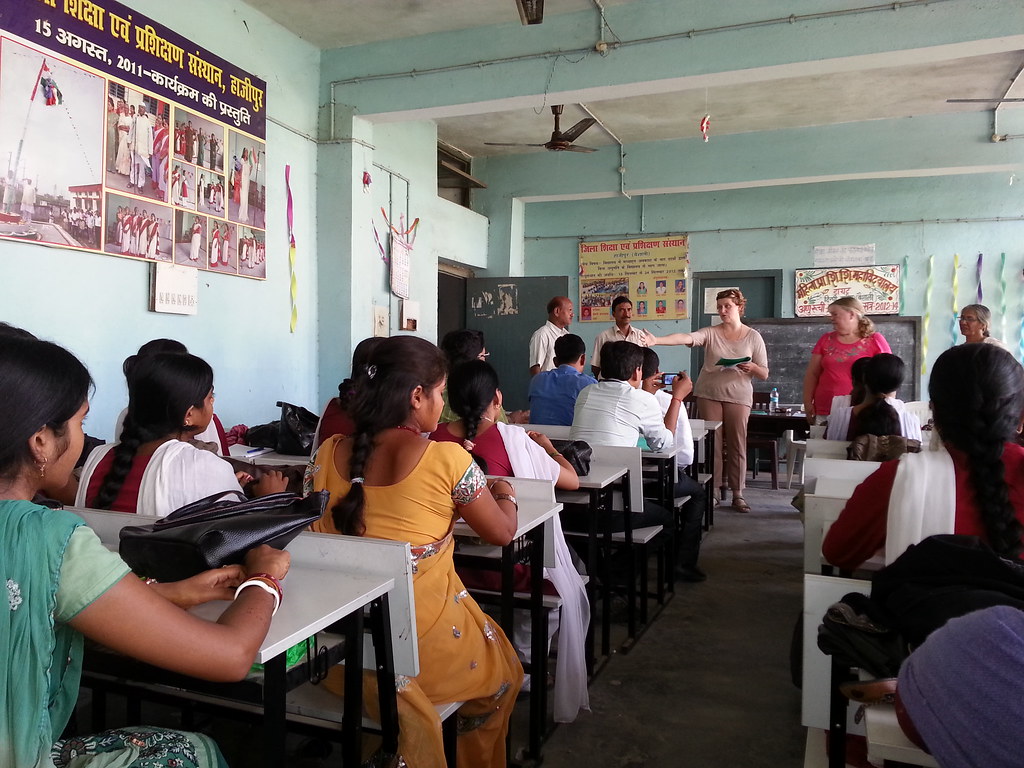
The higher education sector in India has seen a substantial increase in enrolment and rising equity over the past eight years, as revealed by the All India Survey on Higher Education (AISHE) 2021-22. The Economic Survey 2023-24, tabled in Parliament by Union Finance and Corporate Affairs Minister, Smt Nirmala Sitharaman, highlighted that total enrolment in higher education surged to nearly 4.33 crore in FY22, up from 4.14 crore in FY21 and 3.42 crore in FY15—a remarkable 26.5% increase since FY15.
This growth has been driven significantly by underprivileged sections, including SC, ST, and OBC communities, with a notable increase in female enrolment across these groups. Female enrolment in higher education jumped to 2.07 crore in FY22 from 1.57 crore in FY15, reflecting a 31.6% rise. This growing equity in higher education is expected to translate into better employment opportunities for previously disadvantaged sections of society.
India’s educational landscape is vast, with 26.52 crore students in schools, 4.33 crore in higher education, and over 11 crore learners in skilling institutions. The National Credit Framework (NCrF), announced under the National Education Policy 2020 in April 2023, serves as the foundation of a regulatory structure that promotes lifelong learning.
The Economic Survey underscores the importance of mission-mode and cost-effective implementation of educational programmes, especially at the primary level. Effective public spending on education should focus on pedagogy and governance, including monitoring teaching quality, recognising teacher performance, and employing local volunteers to ensure students are taught at the appropriate level.
India is making significant strides in research and development. The number of patents granted in FY24 nearly quadrupled from FY20, reaching almost 1,00,000. According to the World Intellectual Property Organization (WIPO), India had the highest growth in patent filings in 2022 at 31.6%. The country has improved its rank in the Global Innovation Index from 81st in 2015 to 40th in 2023.
Ph.D. enrolment has also surged, with an 81.2% increase from FY15 to FY22. Gross Expenditure on R&D (GERD) has more than doubled since FY11. The newly established National Research Foundation, ‘Anusandhan’, aims to bolster India’s R&D ecosystem with a significant financial commitment from the government.
India’s ascent in high-quality research is marked by its rise to 9th place in the Nature Index 2023, surpassing Australia and Switzerland. The government’s commitment to research and innovation is encapsulated in the interim budget of FY25, which includes a Rs. 1 lakh crore corpus for research, adopting the slogan “Jai Jawan, Jai Kisan, Jai Vigyan, Jai Anusandhan”.
Education
UNESCO Report Highlights Need for Boost in India’s Upper Secondary Education
Published
1 week agoon
July 18, 2024
The recent UNESCO report, “SDG 4 Scorecard Progress Report on National Benchmarks: Focus on Teachers,” reveals that while India is excelling in primary education, the upper secondary education sector requires significant improvements. The report, published by UNESCO, shows that India’s primary education completion rate is at an impressive 94%, nearing its 2025 benchmark of 99%. However, the upper secondary completion rate lags at 51%, against the 2025 benchmark of 84%.
India’s performance in pre-primary participation is also notable, scoring 91%, close to its target of 95%. Conversely, the country struggles with out-of-school rates and lacks sufficient data to assess minimum learning proficiency accurately.
In terms of school internet connectivity, India is making average progress across all educational levels, indicating room for enhancement. The country performs well in the pre-primary teacher training sector, meeting its 2025 benchmark of 95%.
Overall, while India’s primary education sector is performing well, the secondary education sector, especially the upper secondary level, needs focused attention to meet the set benchmarks. The report highlights that 79% of countries have submitted national targets for SDG 4 indicators, with India making strides in some areas but still requiring significant efforts in others.
Education
Workshop on Writing Textbooks in Bharatiya Bhasha for Higher Education Inaugurated by Dr. Sukanta Majumdar
Published
1 week agoon
July 17, 2024
The Minister of State for Education, Dr. Sukanta Majumdar has inaugurated a workshop for Vice Chancellors on the writing of textbooks in Bharatiya Bhasha for higher education in New Delhi. Organised by the University Grants Commission (UGC) and Bharatiya Bhasha Samiti (BBS), the event saw the presence of eminent academicians, including Shri K. Sanjay Murthy, Prof. Chamu Krishna Shastry, and Prof. M. Jagadesh Kumar.
Dr. Majumdar emphasized the importance of developing study materials in Indian languages to reflect the country’s linguistic diversity and ensure accessible education. He highlighted the National Education Policy (NEP) 2020’s role in inspiring youth and expressed gratitude to Prime Minister Narendra Modi and Education Minister Dharmendra Pradhan for their visionary leadership.
Prof. Chamu Krishna Shastry and Prof. M. Jagadesh Kumar shared insights on developing a Bharatiya Bhasha Ecosystem. During the valedictory session, Shri K. Sanjay Murthy launched three projects: ASMITA, Bahubhasha Shabdkosh, and Real-time Translation Architecture. These initiatives aim to produce 22,000 books in 22 scheduled languages, create a grand repository of multilingual dictionaries, and enhance real-time translation capabilities.
Over 150 Vice Chancellors participated in the workshop, organized into 12 groups to plan and develop textbooks in 12 regional languages. The discussions focused on creating new textbooks, establishing standard vocabularies, and improving current textbooks with an emphasis on Indian Knowledge Systems (IKS). The event concluded with a Q&A session addressing queries from participants.
Education
Nurturing Natural Skills: Empowering Youth for the Future
Published
2 weeks agoon
July 16, 2024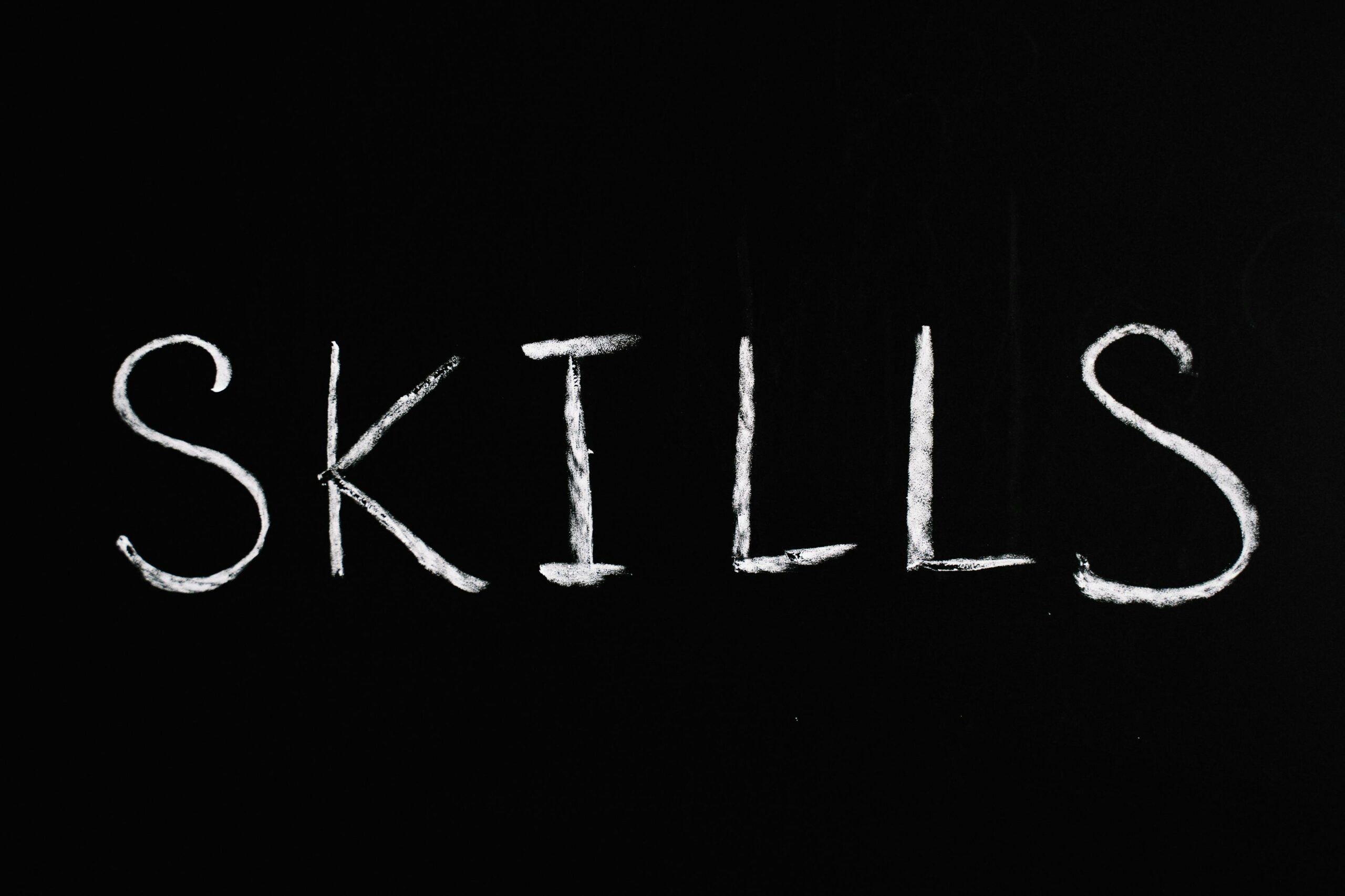
On World Youth Skills Day celebrated on 15 July globally, it’s essential to recognize the incredible potential children inherently possess. Children are naturally curious, energetic, and less afraid of taking risks—qualities that, if nurtured correctly, can form the bedrock of their future success. By identifying and developing these skills, we can empower them to become resilient and adaptable adults ready to face the challenges of the future.
Curiosity: The Catalyst for Learning
Curiosity drives children to explore, ask questions, and seek out new experiences. This innate desire to understand the world around them is a powerful tool for learning. Encouraging curiosity through inquiry-based learning and fostering an environment where questions are welcomed can significantly enhance their educational experience. For instance, project-based learning allows children to dive deep into subjects that interest them, promoting critical thinking and problem-solving skills.
Energy: Channeling Enthusiasm into Productivity
Children are bursting with energy, which, when directed correctly, can lead to incredible productivity and creativity. Schools and parents can harness this energy by providing varied activities that challenge both mind and body. Extracurricular activities like sports, music, and arts not only keep them engaged but also teach them discipline, teamwork, and perseverance. Moreover, incorporating movement into learning, such as through kinesthetic activities, can help maintain their focus and enhance memory retention.
Fearlessness: Embracing Risks and Learning from Failure
Children’s fearlessness and willingness to take risks are qualities that can drive innovation. Creating a safe environment where they can experiment, fail, and learn from their mistakes is crucial. By teaching resilience and the value of perseverance, we can help them develop a growth mindset. Activities that encourage trial and error, such as coding, robotics, and creative writing, can instill confidence and the ability to view failures as opportunities for growth.
Developing These Skills into Strengths
To turn these innate skills into lasting strengths, it is essential to provide continuous support and opportunities for development. Teachers and parents play a pivotal role in this process by:
- Providing Diverse Learning Experiences: Exposure to various subjects and activities helps children discover their interests and strengths. This broadens their horizons and fosters a love for lifelong learning.
- Encouraging Collaborative Learning: Group projects and team activities teach children the importance of collaboration, communication, and empathy. These skills are invaluable in both personal and professional settings.
- Promoting Self-Reflection: Encouraging children to reflect on their experiences helps them understand their strengths and areas for improvement. This practice can build self-awareness and intrinsic motivation.
- Integrating Technology: Leveraging technology in education can make learning more engaging and accessible. Interactive tools and resources can cater to different learning styles and keep children excited about their educational journey.
By recognizing and nurturing the natural skills of curiosity, energy, and fearlessness in children, we can transform these qualities into powerful strengths. This approach not only prepares them for future challenges but also equips them with the resilience and adaptability needed in a rapidly changing world. On World Youth Skills Day, let’s commit to fostering these attributes, ensuring that the youth of today become the innovative leaders of tomorrow.
News
Global Education Crisis Demands Immediate Action, Says UN Secretary-General
Published
2 weeks agoon
July 12, 2024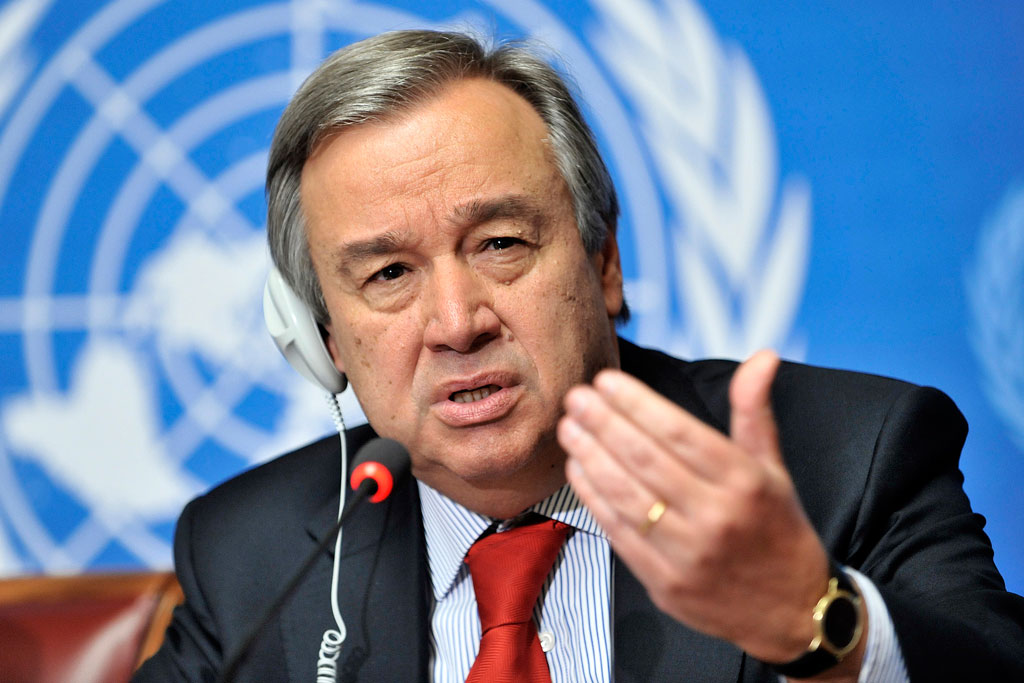
On 11 July 2024, during a Special Event on Transforming Education at the High Level Political Forum (HLPF), UN Secretary-General António Guterres highlighted the urgent need for a “dramatic shift” in global education. This call to action aims to create a more peaceful, sustainable, and just world through genuine learning environments from childhood to adulthood.
The event serves as a precursor to the upcoming Summit of the Future in September. Guterres emphasized that the current state of global education is inadequate, with 84 million children projected to be out of school by 2030 unless significant changes are made. This situation jeopardizes the achievement of Sustainable Development Goal 4 (SDG4), which seeks to ensure inclusive and equitable quality education for all.
Currently, only one-sixth of countries are on track to meet the SDG4 target of universal access to quality education. Guterres pointed out several critical issues, such as slow secondary level completion rates, insufficient skill development for a changing world, and the optional status of early childhood and adult learning. He highlighted the alarming statistic that 70% of children in sub-Saharan Africa cannot read a basic text by age 10.
Financial constraints further exacerbate the crisis. UNESCO estimated that developing nations need to invest $100 billion annually to achieve SDG4, with an additional 50% required for digital education transformation. Guterres noted that many countries spend more on debt servicing than on education or health.
Despite commitments from over 140 countries at the Transforming Education Summit in 2022, progress remains slow and uneven. Guterres proposed a four-point plan to address the crisis, focusing on closing financing and access gaps, supporting teachers, and revolutionizing education systems. He stressed that education is essential for sustainable development, peace, and human rights.
President of the General Assembly, Dennis Francis, echoed Guterres’ sentiments, emphasizing the need for inclusive, equitable, and lifelong learning opportunities. He highlighted the dire state of education in South Sudan, the denial of girls’ education in Afghanistan, and the impact of conflict on education in Ukraine and Gaza.
UN Deputy Secretary-General Amina Mohammed reinforced the message that education is crucial for achieving common goals in sustainable development. She urged global leaders to take decisive action to end the education crisis.
Guterres concluded by stating, “Education is the single-most important investment any country can make. In its people. And in its future. Let’s come together to end the global crisis in education.”
Education
Maharashtra Government Announces Free Higher Education for EWS, SEBC, OBC Girls
Published
3 weeks agoon
July 9, 2024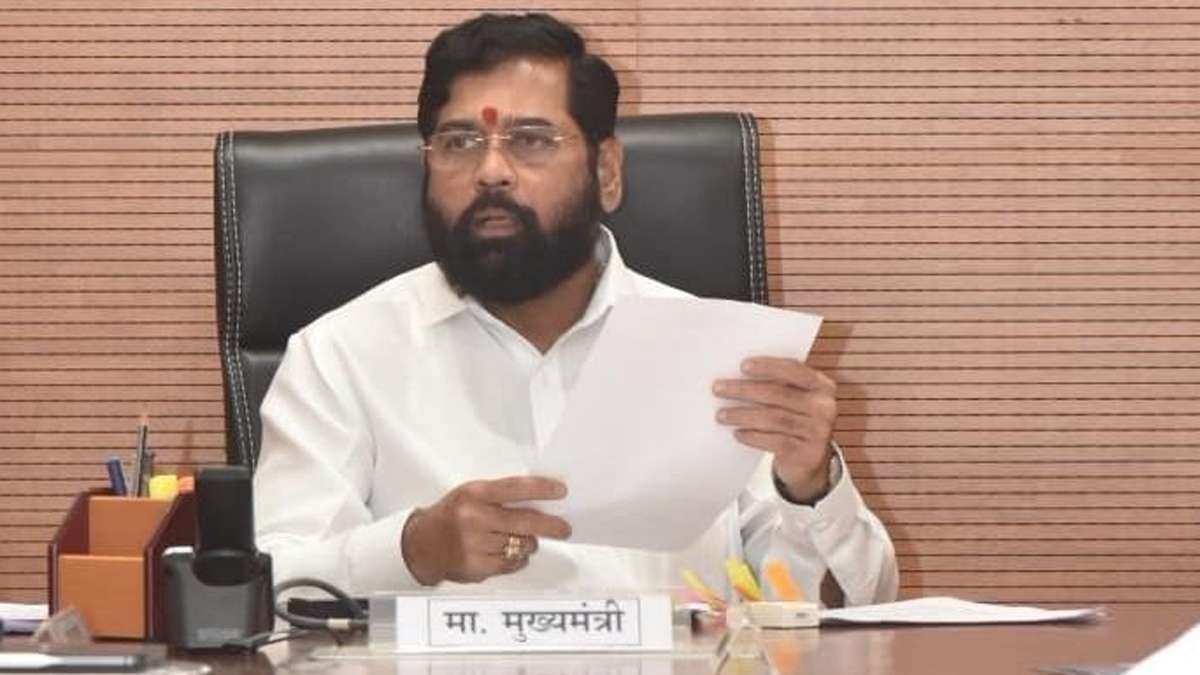
Ahead of the upcoming assembly elections in the state, the Maharashtra government has announced free higher education for girls from Economically Weaker Section (EWS), Socially and Economically Backward Classes (SEBC), and Other Backward Classes (OBC). The policy, which also waives tuition and examination fees for orphaned students regardless of gender, was formalised through a government resolution (GR) during a cabinet meeting chaired by Chief Minister Eknath Shinde. The initiative will commence from the academic year 2024-25 and is projected to cost Rs 906 crore.
The GR states that female students seeking admission to recognised vocational courses through the Centralised Admission Process in government colleges, aided private colleges, semi-aided private colleges, non-aided colleges, polytechnic, autonomous government universities, and open universities will benefit from this scheme. The courses covered include those run by the departments of higher and technical education, medicine, pharmacy, agriculture, animal husbandry, pisciculture, and dairy development. However, students from private autonomous universities, self-funded universities, or those enrolling through management and institutional quota will not be eligible for the scheme.
Female students whose annual family income is Rs 8 lakh or less and who belong to the EWS, SEBC, and OBC categories are eligible for the fee waiver. Both new admissions and current students pursuing their degrees can avail of this facility. This initiative is part of a broader women-focused policy by the Maharashtra government, aiming to enhance educational access and opportunities for underprivileged female students in the state.
(Source- PTI)
Education
Chhattisgarh Introduces Local Language Primary Education in Tribal Areas
Published
3 weeks agoon
July 8, 2024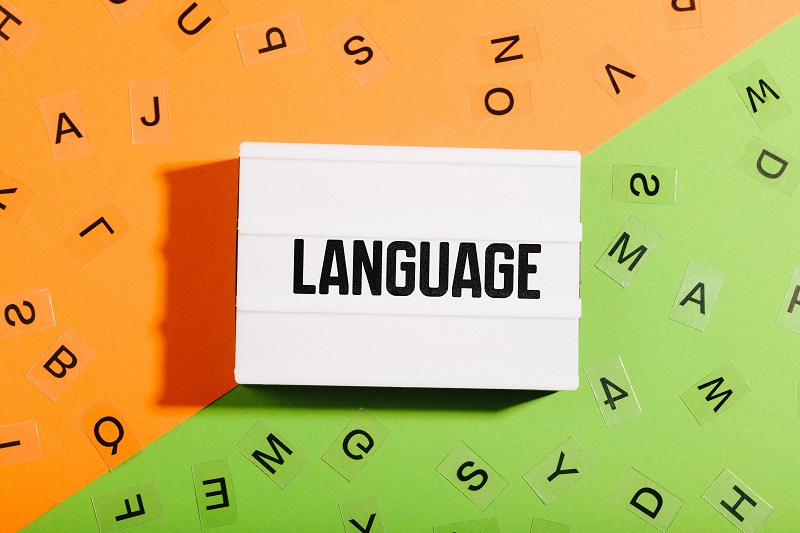
In line with the National Education Policy (NEP) 2020, the Chhattisgarh government has embarked on an initiative to provide primary education in local languages and dialects in remote tribal regions. Chief Minister Vishnu Deo Sai has directed the State Education Department to develop and distribute bilingual books in 18 local languages free of charge. This initiative aims to enhance the quality of educational resources and ensure that children receive education in their mother tongue or local language up to the fifth standard, as recommended by NEP 2020.
During the state-level ‘Shala Praveshotsav’ programme at Bagiya village in the tribal-dominated Jashpur district, Chief Minister Sai highlighted the importance of this initiative. He emphasised that providing education in local languages will not only improve educational outcomes but also help preserve local culture and traditions.
The ‘Shala Praveshotsav’ is an annual event aimed at encouraging school enrolment at the start of the academic session. This year, the event was moved from Raipur to Bagiya, the CM’s hometown, to underscore the significance of the new initiative.
An official from the Education Department mentioned that in tribal areas, primary school exams can now be taken in local languages and dialects. However, exams for higher classes will continue to be conducted in Hindi and English. This move is part of a broader effort to boost the literacy rate in Chhattisgarh, which currently stands at 70.28 percent, below the national average of 76 percent.
Education
NCERT Introduces ‘Poorvi’ For Class 6: A New English Textbook With Indian Focus
Published
3 weeks agoon
July 4, 2024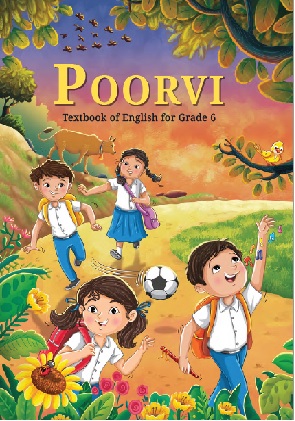
The National Council of Educational Research and Training (NCERT) has launched a new English textbook for class 6 titled “Poorvi”. Unlike its predecessor, “Honeysuckle”, which predominantly featured stories by non-Indian authors, “Poorvi” includes nine prose pieces by Indian authors and five poems by non-Indian authors, as reported by the Indian Express.
This new textbook aligns with the National Curriculum Framework 2023 and the National Education Policy 2020, incorporating revised chapters that reflect an Indian context. The previous textbook, “Honeysuckle,” contained eight poems (seven by non-Indian authors) and eight prose pieces (five by non-Indian authors), along with stories by Indian authors Munshi Premchand and Ruskin Bond.
Significantly, the term “Bharat” appears for the first time in an NCERT textbook, mentioned 19 times in a chapter titled “Culture and Tradition,” while “India” is mentioned seven times. This chapter also features a section called “Hamara Bharat, Incredible India!” emphasising India’s identity as “Bharat.”
Additionally, “Poorvi” includes chapters on the uses of spices beyond cooking and the benefits of yoga, highlighting aspects of Indian culture and tradition. NCERT had initially planned to release new textbooks for classes 3 and 6 earlier this year but encountered delays. The class 3 textbooks are now available.
Joseph Emmanuel, Director (Academics) at CBSE, advised schools to adopt these new syllabi and textbooks for classes 3 and 6 in place of the previous NCERT textbooks until the year 2023, as per a statement to PTI.
Newsletter

Remembering Kargil Vijay Diwas: A Lesson in History, Sacrifice, and Peace for Our Children

Youth Ideathon 2024: CBSE Launches India’s Biggest Entrepreneurship Competition for School Students

Internships in Top 500 Companies, Rs 5k Stipend for Youth: Key Highlights from the Education Budget 2024

Higher Education Enrollment Jumps To Nearly 4.33 Crore In FY22, Up 26.5% From FY15

UNESCO Report Highlights Need for Boost in India’s Upper Secondary Education

Embracing Emojis in the Classroom: A Fun and Polite Approach to Modern Learning

Workshop on Writing Textbooks in Bharatiya Bhasha for Higher Education Inaugurated by Dr. Sukanta Majumdar

Nurturing Natural Skills: Empowering Youth for the Future

Global Education Crisis Demands Immediate Action, Says UN Secretary-General

Celebrating Nikola Tesla: A Beacon for Transforming Education

Maharashtra Government Announces Free Higher Education for EWS, SEBC, OBC Girls

Chhattisgarh Introduces Local Language Primary Education in Tribal Areas

NCERT Introduces ‘Poorvi’ For Class 6: A New English Textbook With Indian Focus

National Teachers’ Award 2024: Self-Nominations Open Until 15th July

Australia’s Doubling of Student Visa Fees to Impact Indian Applicants

Navigating Teen Emotions: The Essential Lessons of ‘Inside Out’

Prerana Students Chart Career Paths with Target Publications’ Event

Kozhikode Becomes India’s First UNESCO ‘City of Literature’

Ladakh Celebrates Achieving Full Functional Literacy

Ministry of Education Launches Tobacco-Free Educational Institutions Campaign

A Story About Turning Math Anxiety into Achievement

Potato of my Classroom

The Liberal Gift: The Key Lessons from “College – Pathways of Possibilities” by Saikat Majumdar

NIIT Foundation and UNICEF YuWaah Empower 5,000 Women and Girls through Data Literacy Training Programme

Goa to Introduce Uniforms in Government Colleges

NCERT Introduces ‘Poorvi’ For Class 6: A New English Textbook With Indian Focus

India’s Eupheus Learning Recognised in TIME’s World’s Top EdTech Rising Stars of 2024

10 Summer Safety Tips for Kids During Summer Breaks

Why Sex Education in Schools is a Battlefield: A Look into Recent Debates and the Path Forward

OpenAI Launches ChatGPT Edu to Revolutionise University Education

Questioning the Trend of Lavish Farewells- #FarewellFiasco

UNESCO’s Happy Schools Initiative: Placing Happiness at the Heart of Education

Kerala Sets National Benchmark with AI Training Programme for 80,000 Teachers

NIIT Foundation and UNICEF YuWaah Empower 5,000 Women and Girls through Data Literacy Training Programme

Empowering Education: LASSI 2024 Concludes with Success and Inspiration

Addressing the Transition From Classrooms to Coaching: The Shifted Focus

One Size Doesn’t Fit All: The Need for Personalised Learning

Pricey Presents, Precocious Pressures: The Cost of Gift-Giving to Children

Heatwaves Disrupt School Education Across India

Beyond Appearances: Prachi Nigam’s Triumph and The Pressures of Appearance-Based Bullying in Schools

What It Takes to Be Well-Educated; Not Just Well-Read

Ivy Pressure Unveiled- The Need to Look Beyond the Ivy Gates

Vape Awareness: Mist of Misconception

The Liberal Gift: The Key Lessons from “College – Pathways of Possibilities” by Saikat Majumdar

University of Manchester To Offer Scholarships for Indian Students

Tripura Launches E-Attendance in Government Schools to Boost Accountability
CBSE Class 12 and Class 10 Results 2024: Girls Lead as Pass Rates Climb

Marked by Marks: The Stereotyping of Student Potential

Unsupervised Explorations: Rethinking Student Trips

Government of India Signs MoU for Digital Library Rashtriya e-Pustakalaya
SGEF2023 | Special Address by Rama Datt, Trustee, Maharaja Sawai Man Singh II Trust, Jaipur

ScooNews | After Movie | ScooNews Global Educators Fest 2023

Aftermovie | NIES2 UP Chapter | 21 Jan 2023

WEBINAR | Gamification in Education: How Digital Badges Can Boost Student Motivation and Engagement

ScooNews | WEBINAR| Importance of Physical Activity for Children at School | Plaeto

SCOONEWS | WEBINAR | WHY DIGITIZING YOUR SCHOOL IS A MUST | TEACHMINT

Keynote Address | Lakshyaraj Singh Mewar

Anurag Tripathi, Secretary, CBSE at SGEF2022

How schools can nurture every student’s genius

Aftermovie | SGEF2022 | Jaipur

Li Andersson | Minister of Education | Finland

Anurag Tripathi, Secretary, Central Board of Secondary Education (CBSE) discusses NEP2020

ScooNews | Early Ed Asia 2019 | Aftermovie
#PodarECEconf : Pursuing quality ECE

#CBSE Class XII #Results #Highlights

The interesting story of India’s educational system | Adhitya Iyer

A young scientist’s quest for clean water

The Danger of Silence: Clint Smith

National Digital Library of India is an initiative by HRD Ministry

Remembering Kalpana Chawla on her birthday!

Message from Sadhguru for Students!
Message from Sadhguru for Students!

The Untapped Genius That Could Change Science for the Better

Eddy Zhong: How school makes kids less intelligent TEDxYouth@Beacon

#TEDxCanberra : What if every child had access to music education…
Trending
-
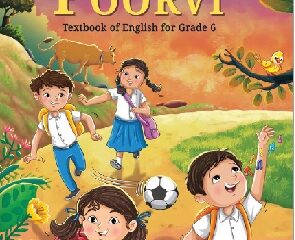
 Education3 weeks ago
Education3 weeks agoNCERT Introduces ‘Poorvi’ For Class 6: A New English Textbook With Indian Focus
-
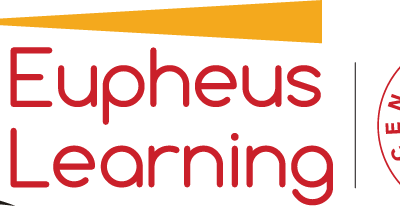
 Education3 months ago
Education3 months agoIndia’s Eupheus Learning Recognised in TIME’s World’s Top EdTech Rising Stars of 2024
-

 Education2 months ago
Education2 months ago10 Summer Safety Tips for Kids During Summer Breaks
-
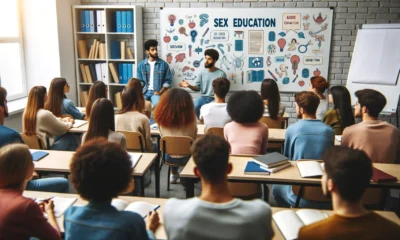
 Education2 months ago
Education2 months agoWhy Sex Education in Schools is a Battlefield: A Look into Recent Debates and the Path Forward
-
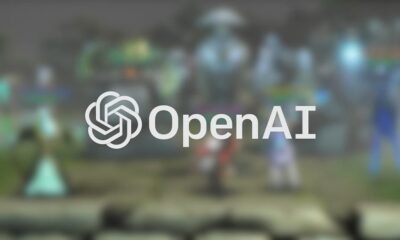
 Education2 months ago
Education2 months agoOpenAI Launches ChatGPT Edu to Revolutionise University Education
-

 Education3 months ago
Education3 months agoQuestioning the Trend of Lavish Farewells- #FarewellFiasco
-

 Education3 months ago
Education3 months agoUNESCO’s Happy Schools Initiative: Placing Happiness at the Heart of Education
-

 Education3 months ago
Education3 months agoKerala Sets National Benchmark with AI Training Programme for 80,000 Teachers
-
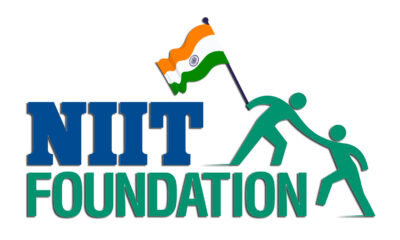
 Education1 month ago
Education1 month agoNIIT Foundation and UNICEF YuWaah Empower 5,000 Women and Girls through Data Literacy Training Programme
-
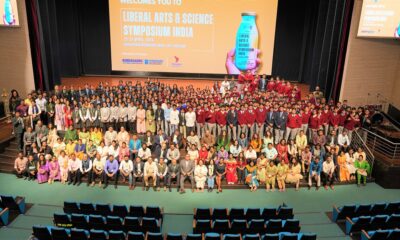
 Education3 months ago
Education3 months agoEmpowering Education: LASSI 2024 Concludes with Success and Inspiration


